9 December 2024 to 20 June 2024
¶ Subgenres, subcontinents · 9 December 2024 essay/listen/tech
¶ Know Yourself (For Free) · 30 November 2024 listen/tech
It's that time of year when companies begin pretending that a) the year is already over, and b) you should be grateful to them for giving you a tiny yearly glimpse of your own data.
But your data is yours. You shouldn't have to elaborately ask for it, but that tends to be the state at the moment. You can get your streaming history from Spotify by going to Account > Security and privacy > Account privacy (of course). They're hoping you don't, because they really want you to eagerly wait for them to tell you what you listened to this year (not counting the last few weeks of it) in parsimoniously abbreviated detail and laboriously garish graphic design.
But if you do, because you can, and you get a Spotify API key, which you can, then you can play with Curio, my experimental app for organizing music curiosity. Curio does a potentially puzzling assortment of things that I like to do, but it also has a query language, so that neither of us is limited by what I already think I want.
And so, among other things, you can make your own Wrapped.
Request your data. When you get it, it'll be a zip file. Unzip it and you'll get a folder full of files. Go to the Curio query page. Hit the "Load more data" button and select all the downloaded files in that folder whose names start with "Streaming_History_Audio_". Curio will stitch them all back together for you. Now you have your listening history.
Of course, to make sense of your listening history, you would need a bit more data. But you could run this query:
listening history
:ts>=2024
:ms_played>=30000
|id=(...spotify_track_uri,([:]),split.split:@3)
|track info=(.id.other tracks)
:(.track info.album.release_date:>2024)
|date=(...ts,(T),split.split:@1)
Translated, that says:
- start with your whole listening history
- filter that to just the plays from 2024
- filter that to just the songs you played at least 30 seconds of
- perform some arcane shenanigans to extract the ID from the Spotify track URI
- use that ID to get the full track info from the Spotify API
- filter the list to just the tracks that were released in 2024, because to a music person that's what "year in music" means
- extract the date from the Spotify timestamp
Hit Enter to run that, and then type "2024 tracks full" in the query-name box to the right, and hit Enter there too.

Now you have the right data to start doing some analysis.
You could now, for example, run this query:
2024 tracks full
/artist=(.track info.artist:@1),song=(.track info.name),date
|points=(....count,sqrt....sqrt)
/artist,song
|points=(.of....points,total)
#rank=points
- take the 2024 tracks from the first query
- group them by artist, song name and date
- give each artist-song-date triplet the quad root of the number of times you played it that day (because I don't trust looping very much)
- group the artist-song-date triplets into artist-song pairs
- score the pairs by totaling their triplets
- sort and rank the pairs by points
You could save that one as "2024 songs scored". Notice that it doesn't end after 5, or even after 100.

You could also do a very similar query for artists, just skipping the song part:
2024 tracks full
/artist=(.track info.artist),date
|points=(....count,sqrt)
/artist
|points=(.of....points,total)
#rank=points

And if you save that one as "2024 artists scored", then you could also use it for:
2024 artists scored
/genre=(.artist.artist genres.genres)
|points=(....count,sqrt....total),top artist=(.of:@1.name)#rank=points
and now you have a top genre list that isn't limited to 5, shows you artist counts and your top artist for each, and because this is all data, even lets you see which artists belong to every genre (click the "of[...]" link).

But those are just questions I asked. You can ask your own.
You should always be able to ask your own questions about yourself. You should demand to be.
But your data is yours. You shouldn't have to elaborately ask for it, but that tends to be the state at the moment. You can get your streaming history from Spotify by going to Account > Security and privacy > Account privacy (of course). They're hoping you don't, because they really want you to eagerly wait for them to tell you what you listened to this year (not counting the last few weeks of it) in parsimoniously abbreviated detail and laboriously garish graphic design.
But if you do, because you can, and you get a Spotify API key, which you can, then you can play with Curio, my experimental app for organizing music curiosity. Curio does a potentially puzzling assortment of things that I like to do, but it also has a query language, so that neither of us is limited by what I already think I want.
And so, among other things, you can make your own Wrapped.
Request your data. When you get it, it'll be a zip file. Unzip it and you'll get a folder full of files. Go to the Curio query page. Hit the "Load more data" button and select all the downloaded files in that folder whose names start with "Streaming_History_Audio_". Curio will stitch them all back together for you. Now you have your listening history.
Of course, to make sense of your listening history, you would need a bit more data. But you could run this query:
listening history
:ts>=2024
:ms_played>=30000
|id=(...spotify_track_uri,([:]),split.split:@3)
|track info=(.id.other tracks)
:(.track info.album.release_date:>2024)
|date=(...ts,(T),split.split:@1)
Translated, that says:
- start with your whole listening history
- filter that to just the plays from 2024
- filter that to just the songs you played at least 30 seconds of
- perform some arcane shenanigans to extract the ID from the Spotify track URI
- use that ID to get the full track info from the Spotify API
- filter the list to just the tracks that were released in 2024, because to a music person that's what "year in music" means
- extract the date from the Spotify timestamp
Hit Enter to run that, and then type "2024 tracks full" in the query-name box to the right, and hit Enter there too.

Now you have the right data to start doing some analysis.
You could now, for example, run this query:
2024 tracks full
/artist=(.track info.artist:@1),song=(.track info.name),date
|points=(....count,sqrt....sqrt)
/artist,song
|points=(.of....points,total)
#rank=points
- take the 2024 tracks from the first query
- group them by artist, song name and date
- give each artist-song-date triplet the quad root of the number of times you played it that day (because I don't trust looping very much)
- group the artist-song-date triplets into artist-song pairs
- score the pairs by totaling their triplets
- sort and rank the pairs by points
You could save that one as "2024 songs scored". Notice that it doesn't end after 5, or even after 100.

You could also do a very similar query for artists, just skipping the song part:
2024 tracks full
/artist=(.track info.artist),date
|points=(....count,sqrt)
/artist
|points=(.of....points,total)
#rank=points

And if you save that one as "2024 artists scored", then you could also use it for:
2024 artists scored
/genre=(.artist.artist genres.genres)
|points=(....count,sqrt....total),top artist=(.of:@1.name)#rank=points
and now you have a top genre list that isn't limited to 5, shows you artist counts and your top artist for each, and because this is all data, even lets you see which artists belong to every genre (click the "of[...]" link).

But those are just questions I asked. You can ask your own.
You should always be able to ask your own questions about yourself. You should demand to be.
¶ 6 November 2024
The next democracy we build will have to be better than this one.
¶ You've had 200 years to figure out how to search for this. · 30 September 2024 listen/tech
Streaming is a great way to listen to classical music. You have to ignore essentially all algorithmic recommendation features, which are generally oriented around tracks and playlists, but this isn't a terrible general policy anyway. Find the music you want to hear, and listen to it. If there are tools that help you find stuff, that's great.
If there are tools that are supposed to help you find stuff, but don't, that's less great. I started thinking about this again after seeing a plaintive Reddit post from somebody trying, unsuccessfully, to find a classical recording composed by (Joseph) Haydn, conducted by (Eugen) Jochum and performed by (Staatskapelle) Dresden. They made it worse for themselves by trying to do it in the Spotify mobile app, but it's not a lot better in the desktop version:
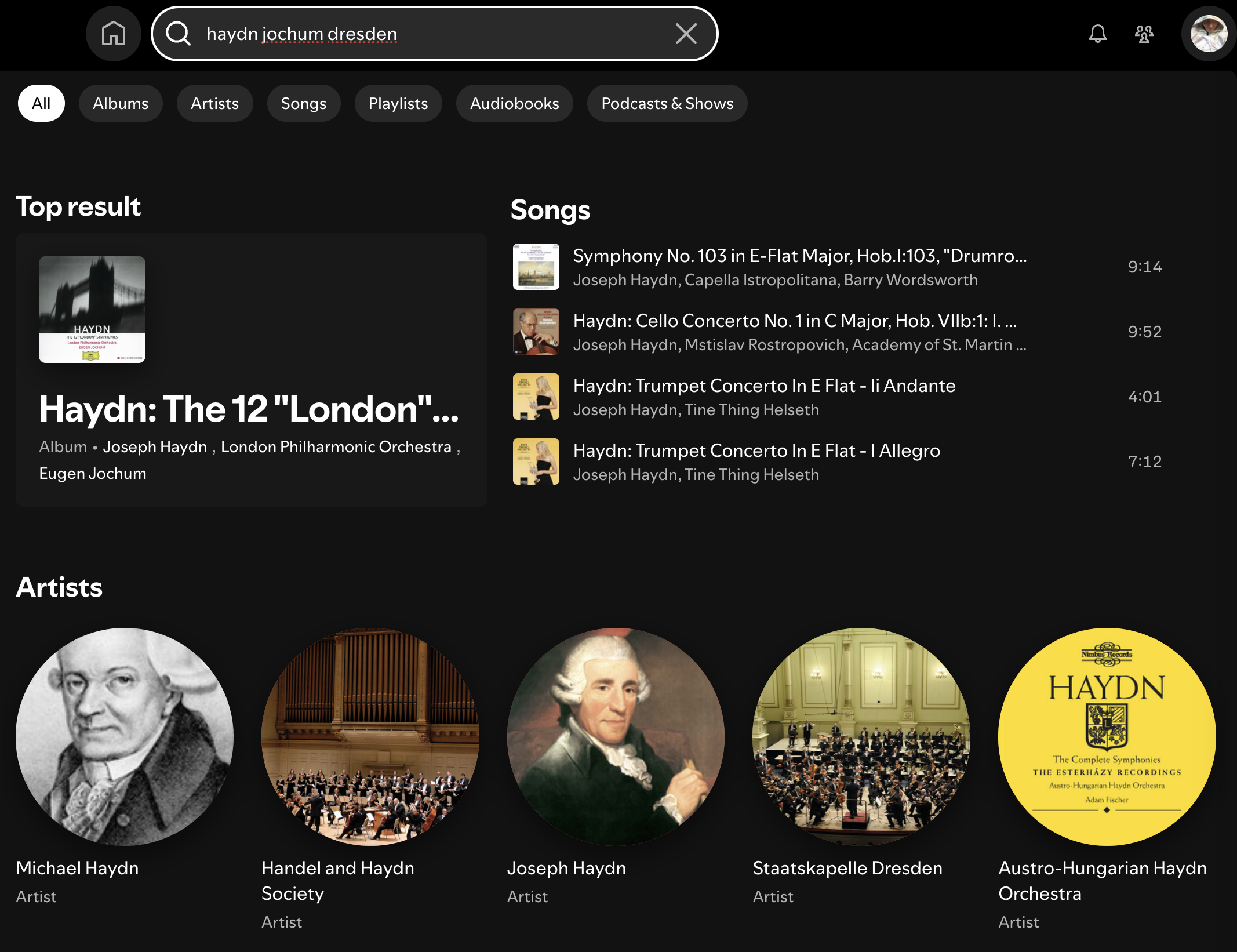
The "Top result" is Haydn and Jochum, but not Dresden. The "Songs" are Haydn without Jochum or Dresden, and the Artists start with, obtusely, Jospeh Haydn's less-famous younger brother. And you see that 3 of 5 classical titles here get truncated before the most important part, despite word-wrap technology having existed for only slightly less of history than Haydn's symphonies. The page does scroll, but that's only helpful if you're looking for "Haydn Radio", which you shouldn't be, or a hot podcast about Haydn, which may or may not exist but I don't care which.
After trying a few other search variations, I was almost ready to conclude that the Haydn recordings in question were hard to find because they weren't actually on Spotify, but finally I looked them up elsewhere, and then I was able to find them on Spotify after all. Part of the problem is that album credits are usually less complete than track credits. This is an industry metadata issue, not a Spotify-specific problem, and there's no reason you should have to care about that difference any more than the Haydns do, but it means none of us are ever going to find the two albums of Haydn / Jochum / Dresden music on Spotify, because they are credited only to Haydn, whose artist page has 1465 releases.
Apple Music, of course, has a whole dedicated classical-music sub-service called Idagio, so we might expect the difference to be like night and day, and indeed it is in terms of color palettes:
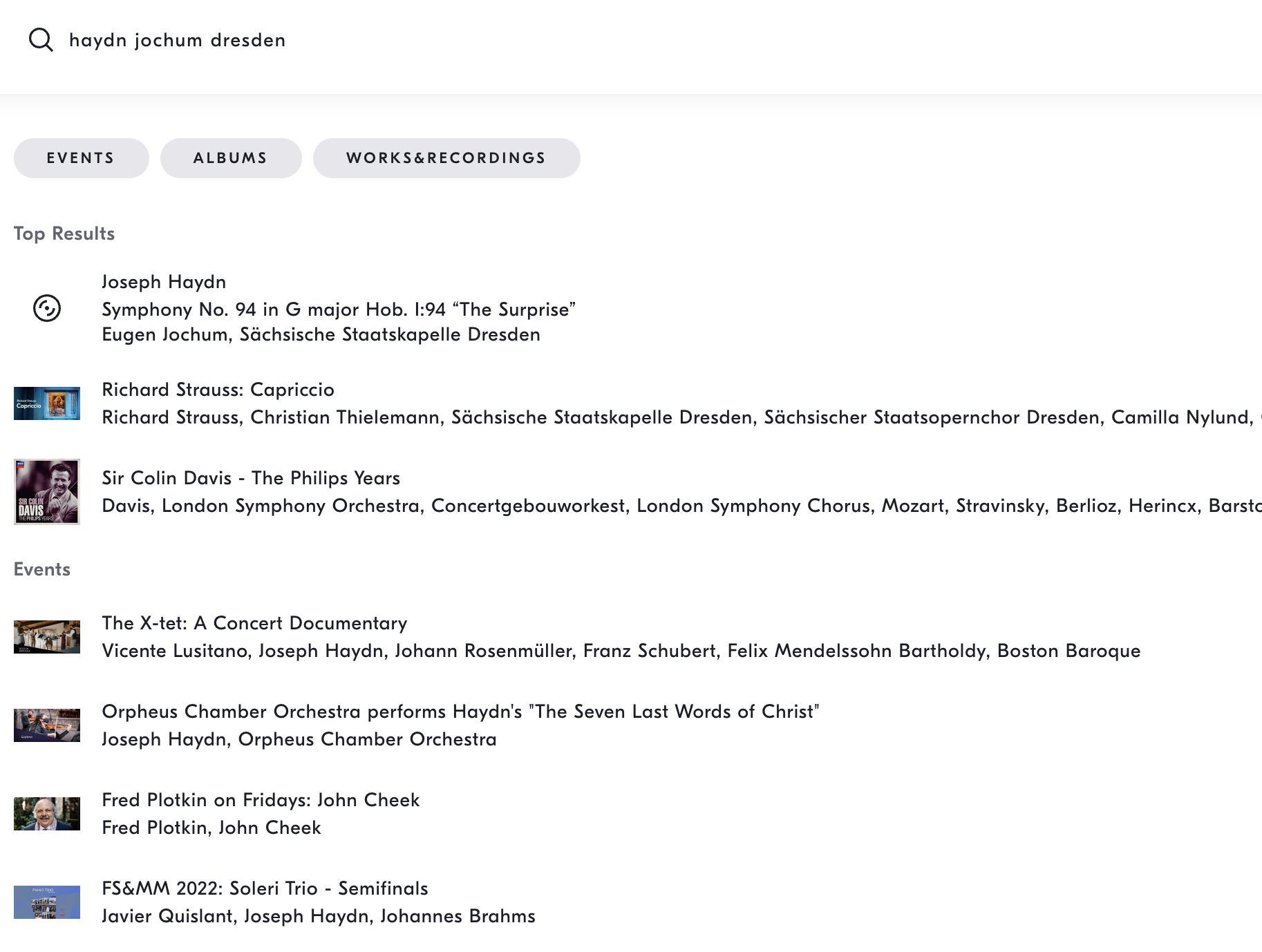
Results-wise, however, a "Haydn Jochum Dresden" search here still finds only one of the four pieces it should, and a lot of irrelevance instead of the other three, and really we shouldn't need a whole bespoke streaming service just to upgrade our search success from 0/4 to 1/4.
We only need a little extra syntax to say what we want, and a tiny bit of extra post-processing to get it. Both of which I've now added to my existing research tools on everynoise.com.
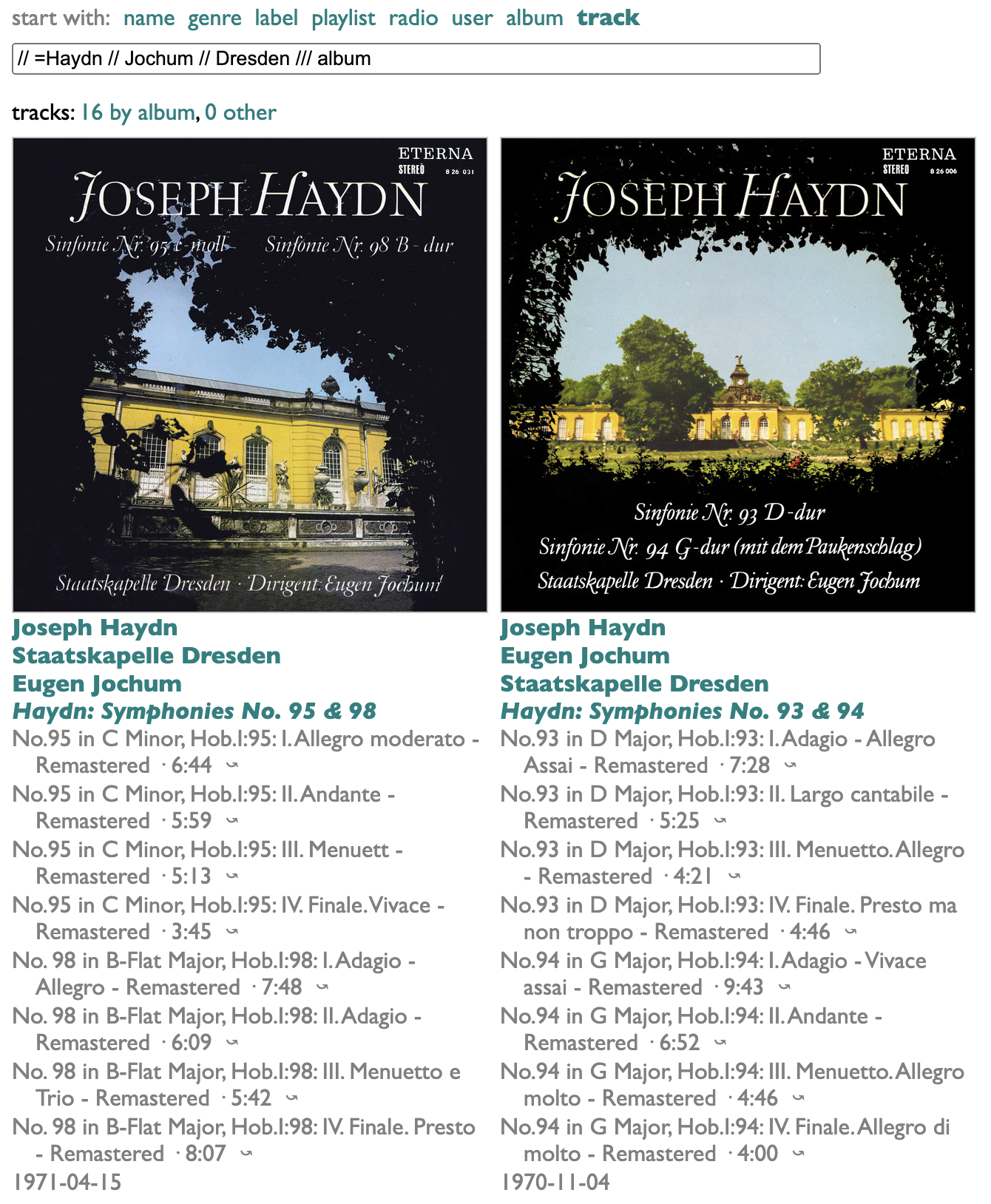
The main addition is that you can append // to your track-name search (which here is blank because we're trying to find these without remembering what they're called) to filter by artist. Doing =Haydn looks for "Haydn" only in the name of the first artist, which in the case of classical releases is always the composer. +Dresden would specify matching "Dresden" in an artist name other than the first, but there's nobody named "Haydn Dresden" yet, so I didn't bother. Partial matches are fine in all cases, so we don't need to know whether Haydn is listed as Joseph or Franz Joseph, nor how to spell Eugen or Staatskapelle.
The extra bonus feature I added is the /// album bit, which says to find only tracks that appear on proper albums (as opposed to dodgy mood compilations), and then to group and sort the results by those albums. I also took the time to factor common prefixes out of the titles, which spares us only the repeated word "Symphony" in the case of the two omnibus Haydn packages above, but produces much more readable track lists in some more-common cases. Take, e.g., this:
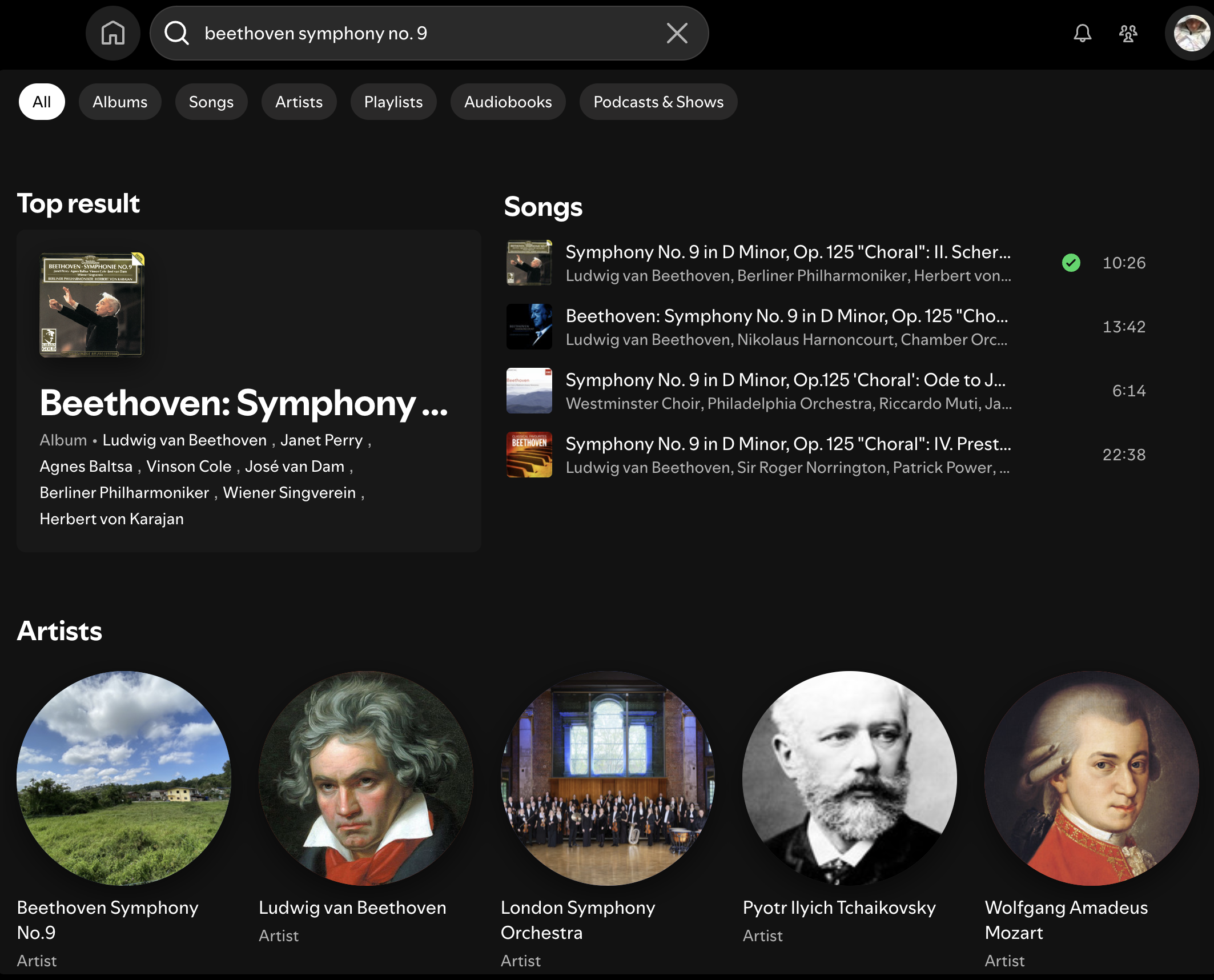
Ah yes, Beethoven's immortal symphony "...", popularly known as "Ellipsica". All eight lines in the "Songs" section are truncated, and trust me that you don't need to know what the "artist" called "Beethoven Symphony No. 9" sounds like, unless you are currently less than six months old and suffering from colic. Why are there spaces before the commas in the "Top result" artist list, and why does every artist in the boldly labeled Artists section say "Artist" again under it?
With a little care, filtering and sorting, we can get this:
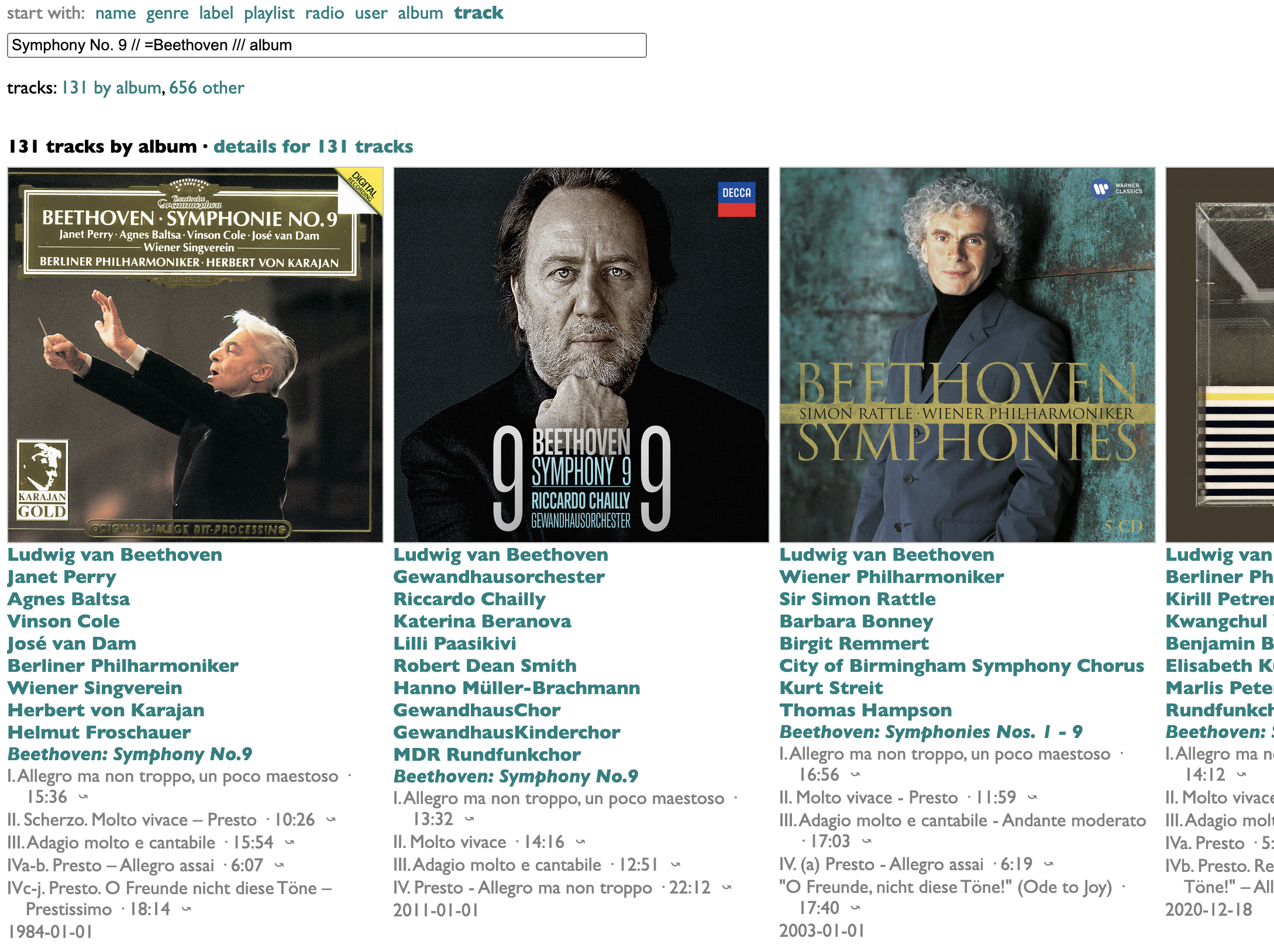
Real albums. Readable movements. No recommendations, no moods except for your own.
And none of this was even specific to classical music. You can use these same tools to find that Bowie/Jagger song about dancing:
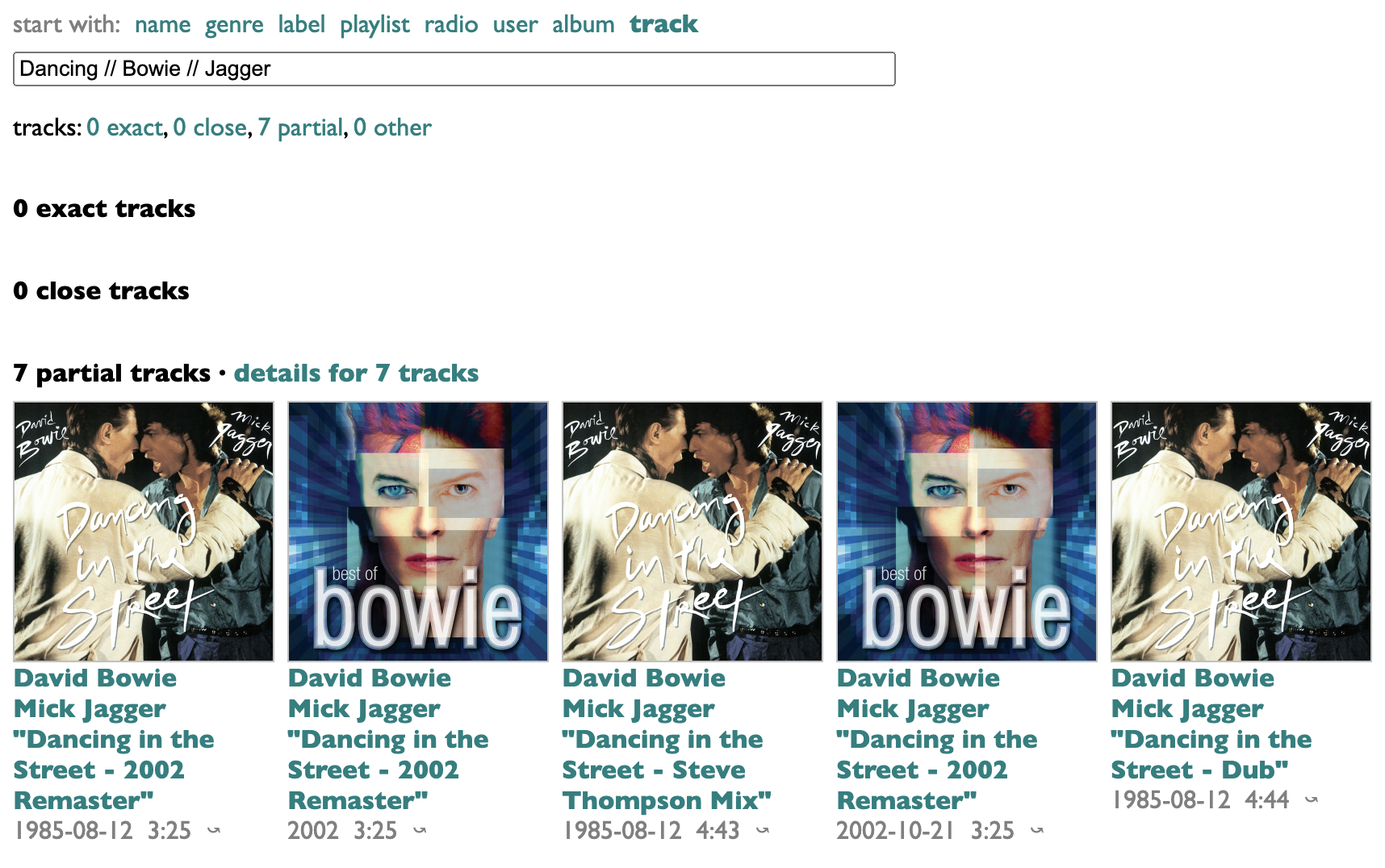
To be fair, you could find that, plus some bonus Björk, with normal searching:
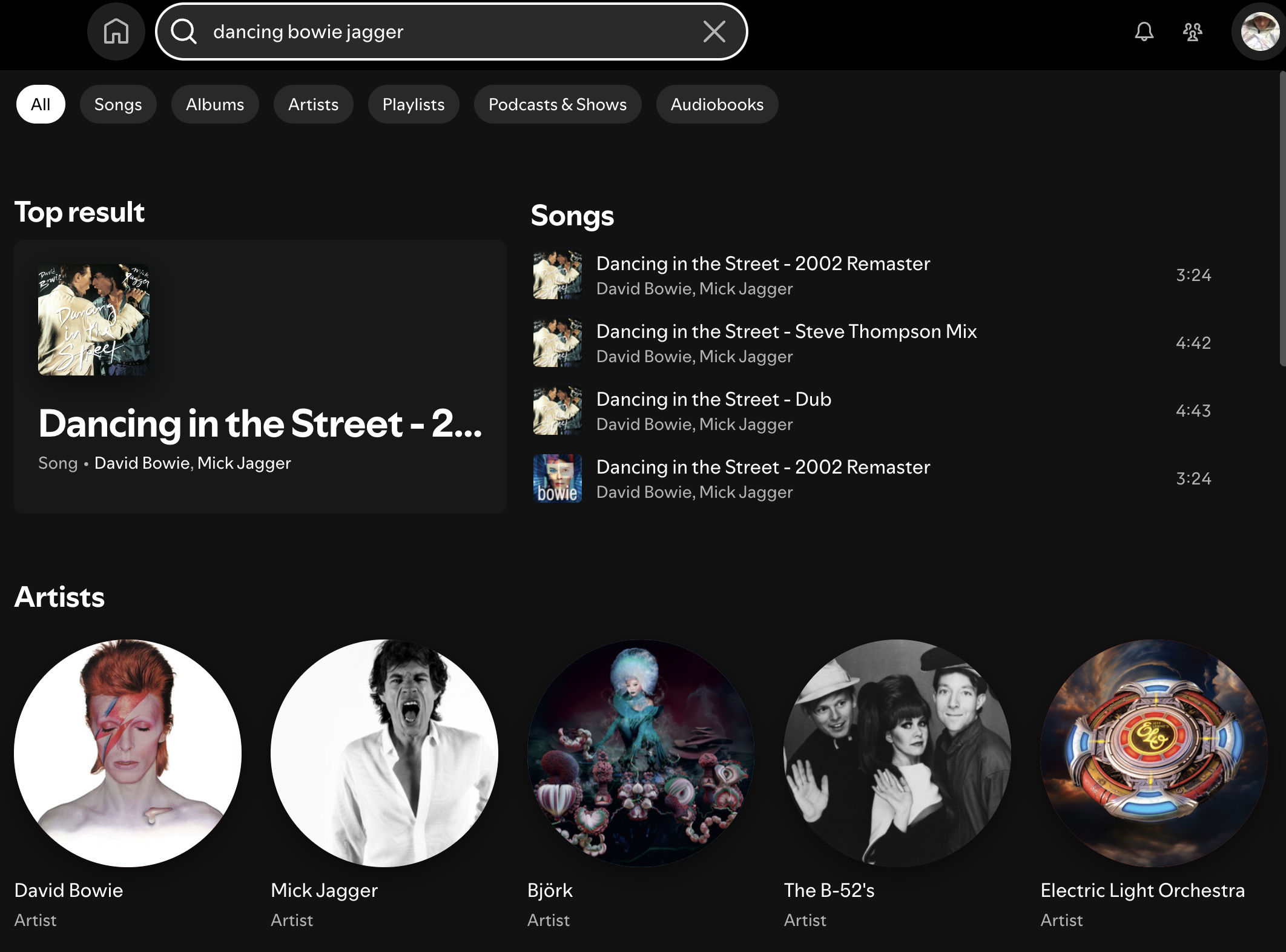
But my version has a wildcard filter so we can find all of Bowie's collaborations:
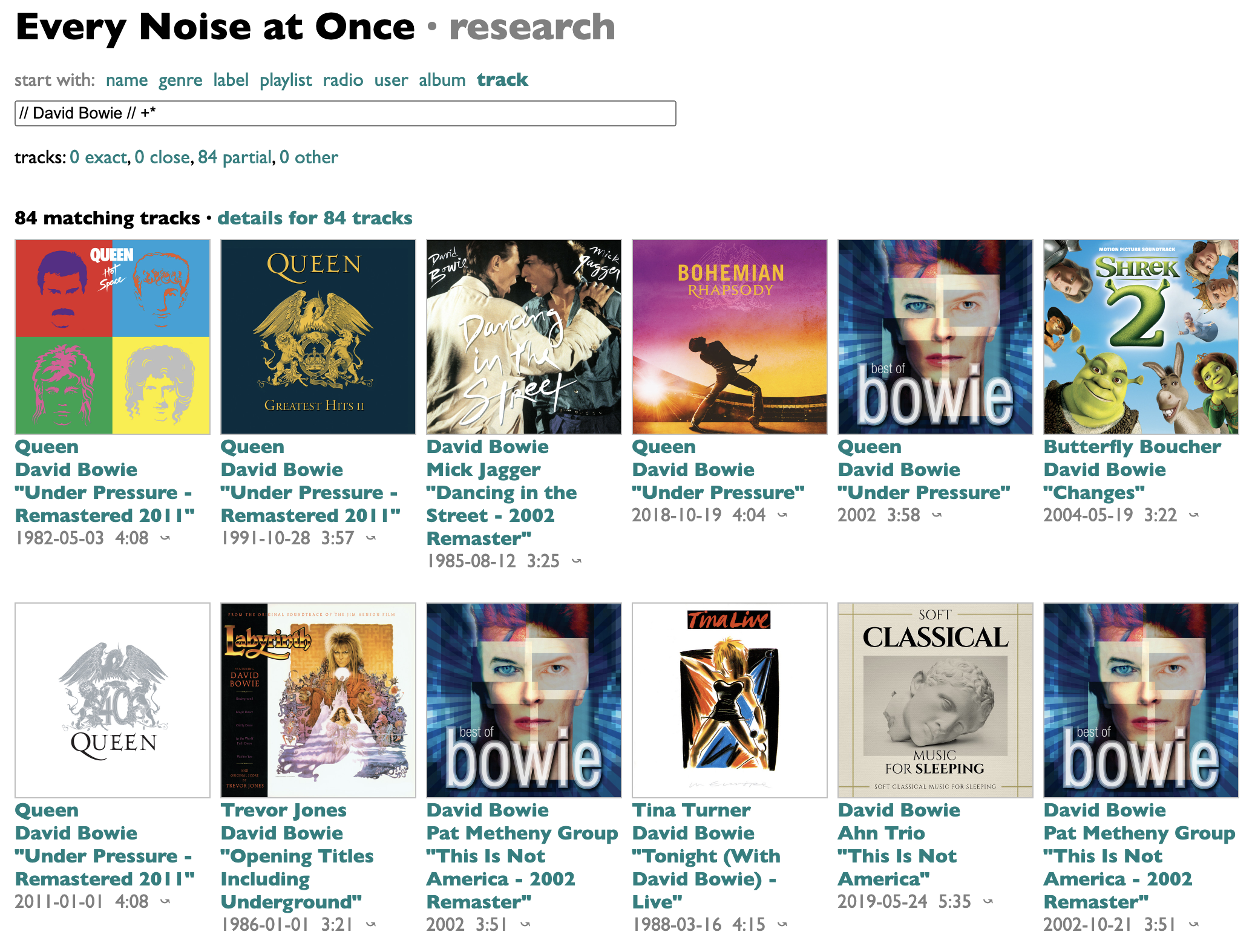
And even deduplicate them by song:
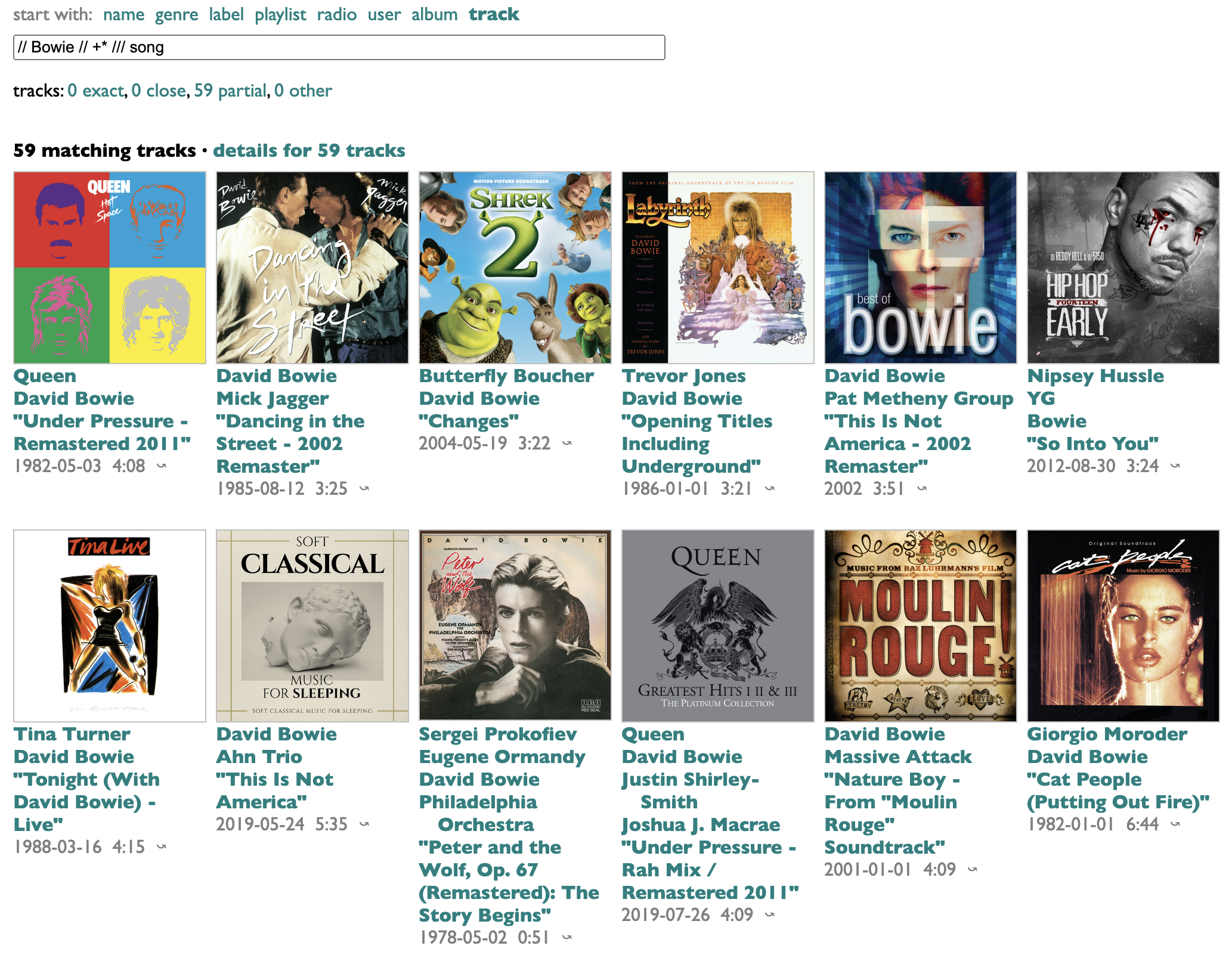
Or all the Ghetts tracks with no guests:
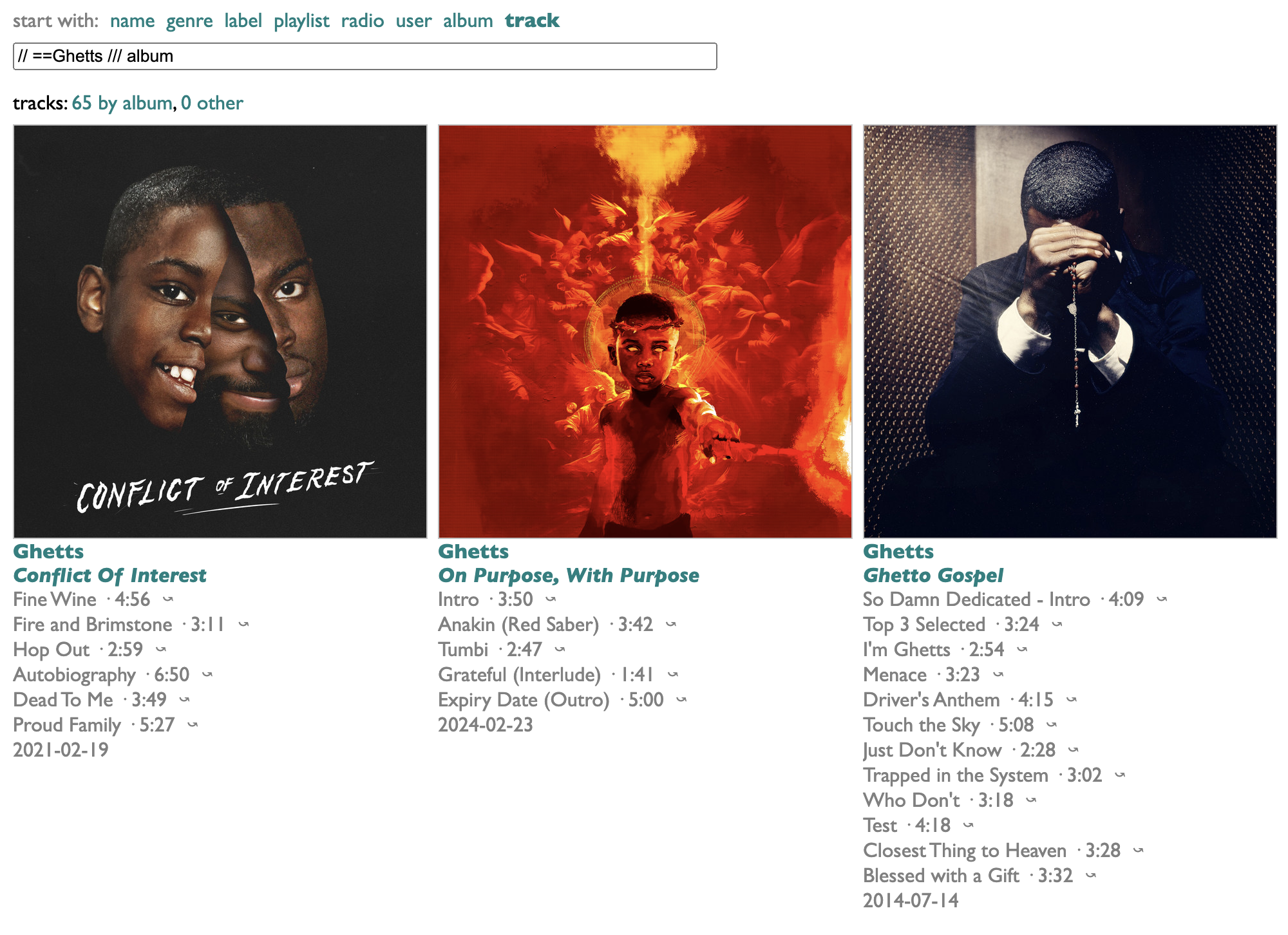
Or all the non-CHVRCHES songs featuring CHVRCHES:
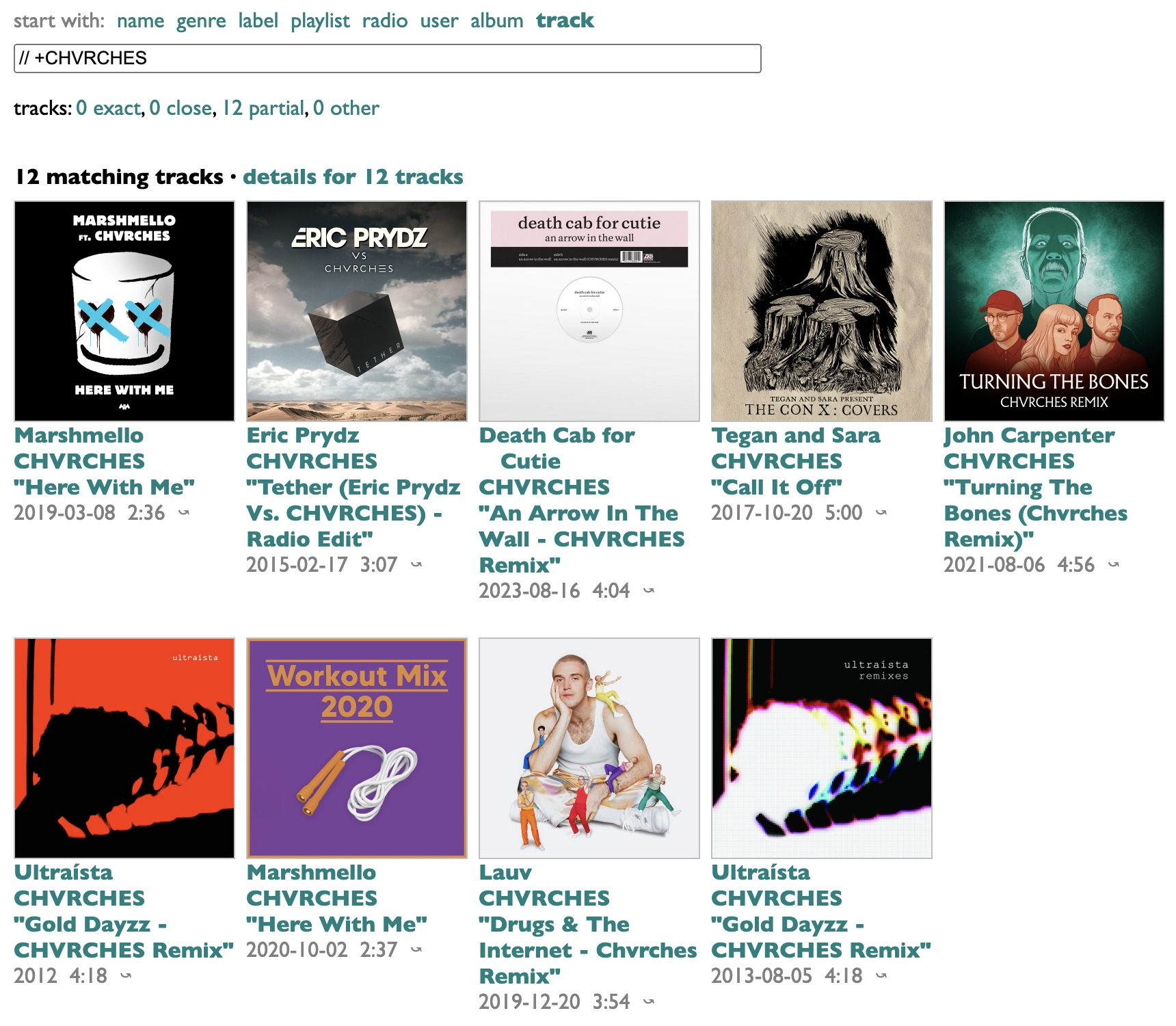
It's not complicated. We don't need AI for this.
(Which is good, because the AI is, maybe, not quite ready...)
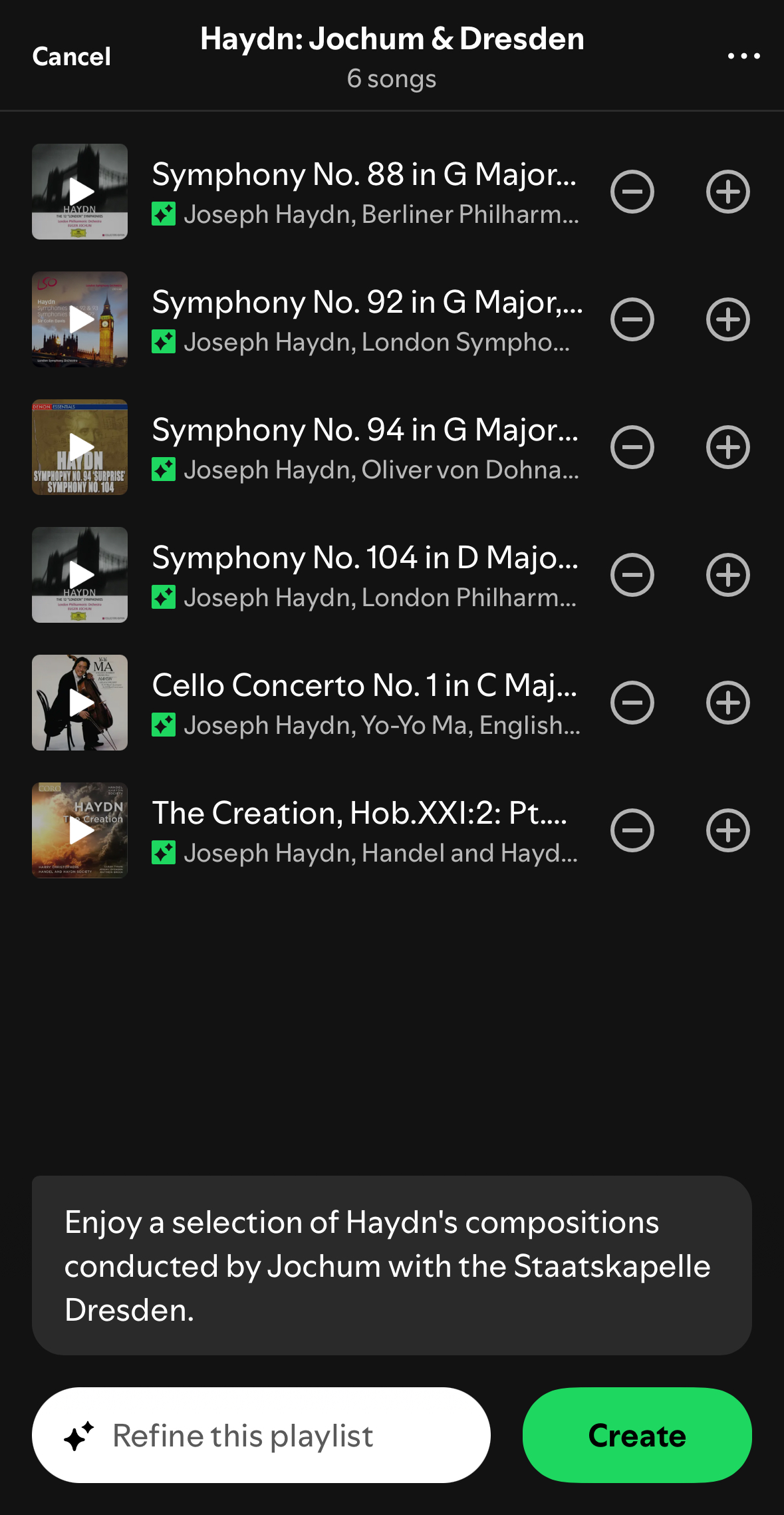
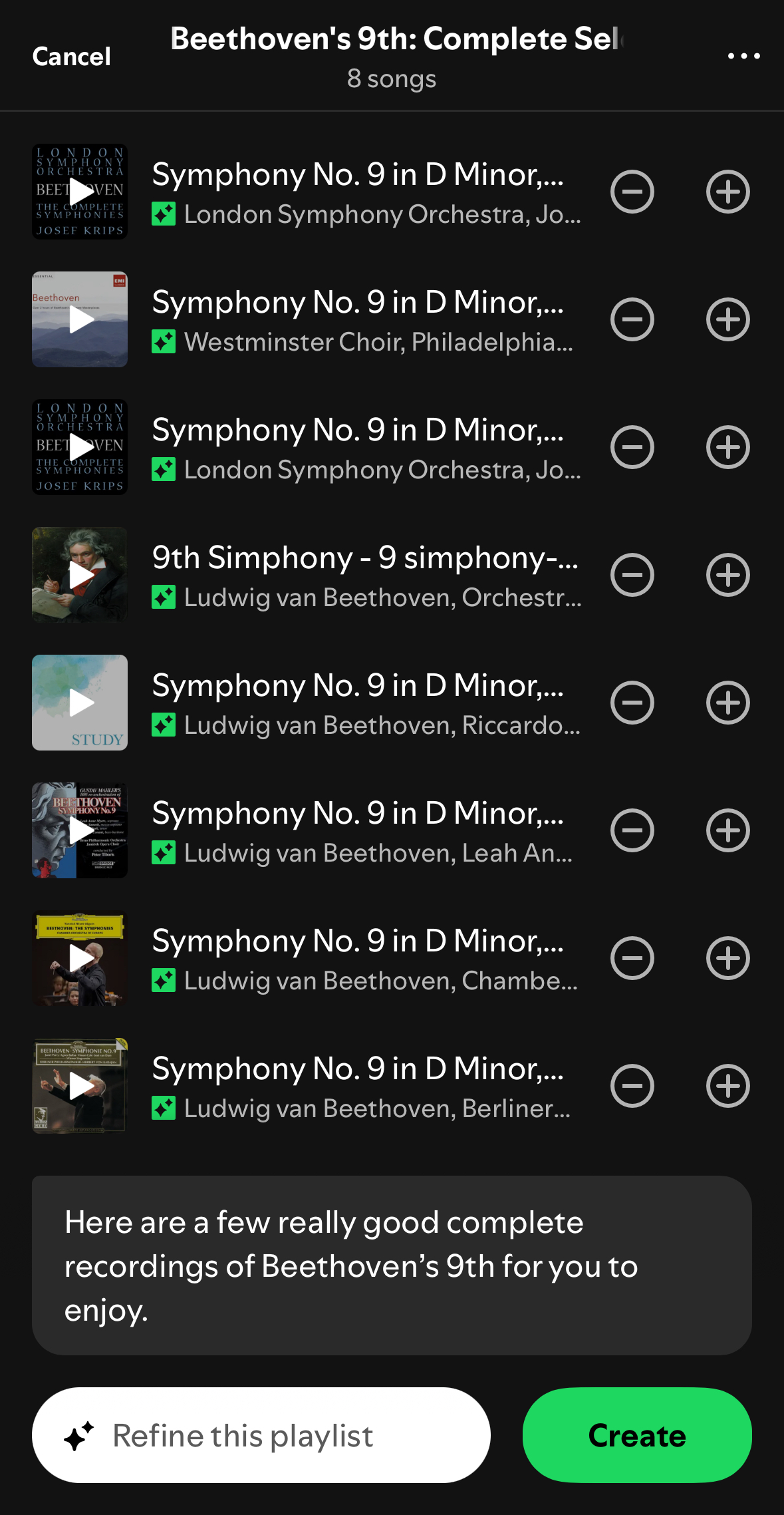

If there are tools that are supposed to help you find stuff, but don't, that's less great. I started thinking about this again after seeing a plaintive Reddit post from somebody trying, unsuccessfully, to find a classical recording composed by (Joseph) Haydn, conducted by (Eugen) Jochum and performed by (Staatskapelle) Dresden. They made it worse for themselves by trying to do it in the Spotify mobile app, but it's not a lot better in the desktop version:

The "Top result" is Haydn and Jochum, but not Dresden. The "Songs" are Haydn without Jochum or Dresden, and the Artists start with, obtusely, Jospeh Haydn's less-famous younger brother. And you see that 3 of 5 classical titles here get truncated before the most important part, despite word-wrap technology having existed for only slightly less of history than Haydn's symphonies. The page does scroll, but that's only helpful if you're looking for "Haydn Radio", which you shouldn't be, or a hot podcast about Haydn, which may or may not exist but I don't care which.
After trying a few other search variations, I was almost ready to conclude that the Haydn recordings in question were hard to find because they weren't actually on Spotify, but finally I looked them up elsewhere, and then I was able to find them on Spotify after all. Part of the problem is that album credits are usually less complete than track credits. This is an industry metadata issue, not a Spotify-specific problem, and there's no reason you should have to care about that difference any more than the Haydns do, but it means none of us are ever going to find the two albums of Haydn / Jochum / Dresden music on Spotify, because they are credited only to Haydn, whose artist page has 1465 releases.
Apple Music, of course, has a whole dedicated classical-music sub-service called Idagio, so we might expect the difference to be like night and day, and indeed it is in terms of color palettes:

Results-wise, however, a "Haydn Jochum Dresden" search here still finds only one of the four pieces it should, and a lot of irrelevance instead of the other three, and really we shouldn't need a whole bespoke streaming service just to upgrade our search success from 0/4 to 1/4.
We only need a little extra syntax to say what we want, and a tiny bit of extra post-processing to get it. Both of which I've now added to my existing research tools on everynoise.com.

The main addition is that you can append // to your track-name search (which here is blank because we're trying to find these without remembering what they're called) to filter by artist. Doing =Haydn looks for "Haydn" only in the name of the first artist, which in the case of classical releases is always the composer. +Dresden would specify matching "Dresden" in an artist name other than the first, but there's nobody named "Haydn Dresden" yet, so I didn't bother. Partial matches are fine in all cases, so we don't need to know whether Haydn is listed as Joseph or Franz Joseph, nor how to spell Eugen or Staatskapelle.
The extra bonus feature I added is the /// album bit, which says to find only tracks that appear on proper albums (as opposed to dodgy mood compilations), and then to group and sort the results by those albums. I also took the time to factor common prefixes out of the titles, which spares us only the repeated word "Symphony" in the case of the two omnibus Haydn packages above, but produces much more readable track lists in some more-common cases. Take, e.g., this:

Ah yes, Beethoven's immortal symphony "...", popularly known as "Ellipsica". All eight lines in the "Songs" section are truncated, and trust me that you don't need to know what the "artist" called "Beethoven Symphony No. 9" sounds like, unless you are currently less than six months old and suffering from colic. Why are there spaces before the commas in the "Top result" artist list, and why does every artist in the boldly labeled Artists section say "Artist" again under it?
With a little care, filtering and sorting, we can get this:

Real albums. Readable movements. No recommendations, no moods except for your own.
And none of this was even specific to classical music. You can use these same tools to find that Bowie/Jagger song about dancing:

To be fair, you could find that, plus some bonus Björk, with normal searching:

But my version has a wildcard filter so we can find all of Bowie's collaborations:

And even deduplicate them by song:

Or all the Ghetts tracks with no guests:

Or all the non-CHVRCHES songs featuring CHVRCHES:

It's not complicated. We don't need AI for this.
(Which is good, because the AI is, maybe, not quite ready...)



¶ New Releases by Genre: the comeback begins · 28 July 2024 listen/tech
Spotify killed the New Releases by Genre function of Every Noise at Once when they laid me off and cut off my website from its internal data sources. As I've described previously, the fact that a functional new-release tool required internal data-access, to begin with, was a result of minor structural contingencies, not conceptual or business objections, but in 10 years of working at Spotify I do not remember ever successfully persuading the API team to change a feature. If we're going to get NRbG back, we're going to have to figure out how to rebuild it with the tools we are allowed.
But since I need NRbG myself, emotionally not just logistically, I've kept experimenting with ways of recreating it. It didn't actually take me very long to build a personal version of it. Spotify still does have the best music-service API, by far, and the brute-force approach of searching for artists by genre, and then checking the catalogs of each of those artists one-by-one for new releases every week, does basically work. It just doesn't scale. I'm willing to wait a few minutes for the things I care about the most; it doesn't work to make everybody wait for everything anybody cares about. When I worked at Spotify, I could try to solve some problems for everybody at once; from outside, I am too constrained by API rate limits.
The code I wrote, however, would work for you as readily as for me. Even my "personal" tools are general-purpose, because I assume I'll be curious tomorrow about something I didn't care about today. Maybe it's more accurate to say that I tend to build tools to extend my curiosity as much as to satisfy it, or that extending and satisfying describe a propulsive cycle of curiosity more than alternative goals. I would love to inspire this same kind of curiosity in you, but I would settle for giving you some power and letting you discover what you do with it.
And a few days ago it occurred to me that I can. Or, rather, I can give you the power of my knowledge and experience embodied in code, and you can get the power of running it for yourself by signing up for your own API keys. Which is easy and free.
Here's how:
- go to developer.spotify.com
- click "Log in", and log into your regular Spotify account
- click your name in the top right, and pick Dashboard
- read and accept the developer terms of service
- on the Dashboard page, click "Create app" in the top right
-- App name: NRbG
-- App description: New Releases by Genre
-- Website: (leave blank)
-- Redirect URIs: localhost (NRbG doesn't actually use this)
-- [x] Web API (leave the others unchecked)
-- [x] I understand and agree etc.
- click Save
- on your new NRbG app page, click Settings in the top right
- click "View client secret"
- copy your "Client ID" and "Client secret"
- go to NRbG (DIY version)
- paste your client ID and secret into the boxes
- hit Enter
Now you have power.
The new version of NRbG is a little different from the old one. Instead of a list of all the genres in the world, it has a text box. Type a genre name there and hit Enter, and it will start looking for new releases by artists in or around that genre that came out in the last release week (from Saturday through Friday, because Friday is the traditional music-industry release day).

After a while it might start finding some.

The orange letters are the first letters of each song-title, and you can click on them to hear samples. If a new release has songs that already came out some other way, they will (usually) be grayed out here, like with the gray S above for the advance single "Sekuyiso Isikhathi" from THANDAZANI's album Sasibaningi.
If you click "show track URIs", at the bottom, you'll get a list of the URIs for all the new tracks from the releases you have checked in the list, which you can copy and paste into a blank (or existing) Spotify playlist (using command-C, command-V in the Spotify desktop app). There's also a "save playlist" option, which create a new playlist for you directly if you want.
Because I built this for myself, there are a few non-obvious features.
The text box actually takes a list of things, separated by + signs, and the things can each be any of these:
- a genre (e.g. maskandi or gothic symphonic metal)
- a Spotify artist link/URI
- the name of an individual artist, in quotes, like "Nightwish", although this will find the most popular with that name, so URIs are always safer
- a Spotify playlist link/URI, to be interpreted as a list of artists
- @ and then the name of a record label (e.g. @Profound Lore; the spelling has to be exactly right, but see the note later about playlists)
If your list starts with a +, the results will be added to the bottom of the current list; otherwise the current results will be replaced.
The ">>" link encodes your current parameters, so if you click that, you can then bookmark the resulting URL for reuse.
New releases for selected labels, because labels are the only thing that works properly in new-release API searching, are each shown individually, in labeled groups. Everything else in a given list is combined to make a consolidated set of artists, those artists are then checked for their closest related artists (via Fans Also Like), and the whole thus-expanded list of artists is reordered by collective relevance and then checked individually in order for new releases.
If you don't know the exact genre names you want, offhand, you can also just type a partial name and an asterisk, like metal*, and it will give you a list of all the genre names that include that word. Or you could go to everynoise.com and type an artist name into the search box in the top right to see what genres they belong to.
The words "new" and "releases", in "new releases by genre" at the top, are both actually mode controls. "new" switches back and forth between "new", for new-release mode, and "top", for one-top-release-per-artist sampler mode, not constrained by dates. "releases" cycles through "releases" (everything), "albums" (no singles or compilations) and "singles" (no albums or compilations).
If you want to get only 1 track per release, for sampler purposes, you can put "1/" before your list. Or indeed any number and then a "/". This will pick the most popular however-many tracks on each release, and gray out the rest (and exclude them from the URI list) like the non-new tracks on new releases.

You might notice that this app, although it requires your API keys, does not itself log into your Spotify account. This is intentional. Many Spotify features are personalized for you in complicated ways, if you are logged in, and for exploratory purposes we don't want that. This means, too, that this app cannot access or modify your personal information. But if you want to control its behavior by giving it more information, it can look up non-private playlists, so that's the mechanism.
If you use a playlist as input (yours or anybody else's), it will look for new releases by the primary artists of the tracks in that playlist and their related artists, but excluding the specific releases already in the playlist. So if you, like me, spend a lot of time using this tool every Friday to make a playlist of new releases you want to hear, you can put that playlist's URI back into the same tool and it will check to see if there's anything else related that you might have missed.
In addition, once you've set up your API keys and NRbG is working, the playlist-profile page in the everynoise research tools also gets a couple added features for finding new releases. Put a playlist link or URI into that view, and it already shows you genres and record labels for every track in the list. But scroll to the bottom of the page, and you'll also see something like this:

The "see new releases" line gives you three links to NRbG for different ways of expanding on this list, each with a set of parameters pre-filled from the data in this playlist.
And, for one last bonus feature, you can check an earlier week by putting that week's Friday date (in YYYY-MM-DD format) at the beginning of your input as an override, like this:

and hit Enter to get:

You can even check whole years by including just a year, although be warned, in both cases, that release-date data gets unreliable pretty quickly once you go back beyond the very recent past.
I don't know what else I'll do with this. Probably more, because it's fun. Feedback, error reports and ideas are all welcome, in the meantime.
See what you find.
But since I need NRbG myself, emotionally not just logistically, I've kept experimenting with ways of recreating it. It didn't actually take me very long to build a personal version of it. Spotify still does have the best music-service API, by far, and the brute-force approach of searching for artists by genre, and then checking the catalogs of each of those artists one-by-one for new releases every week, does basically work. It just doesn't scale. I'm willing to wait a few minutes for the things I care about the most; it doesn't work to make everybody wait for everything anybody cares about. When I worked at Spotify, I could try to solve some problems for everybody at once; from outside, I am too constrained by API rate limits.
The code I wrote, however, would work for you as readily as for me. Even my "personal" tools are general-purpose, because I assume I'll be curious tomorrow about something I didn't care about today. Maybe it's more accurate to say that I tend to build tools to extend my curiosity as much as to satisfy it, or that extending and satisfying describe a propulsive cycle of curiosity more than alternative goals. I would love to inspire this same kind of curiosity in you, but I would settle for giving you some power and letting you discover what you do with it.
And a few days ago it occurred to me that I can. Or, rather, I can give you the power of my knowledge and experience embodied in code, and you can get the power of running it for yourself by signing up for your own API keys. Which is easy and free.
Here's how:
- go to developer.spotify.com
- click "Log in", and log into your regular Spotify account
- click your name in the top right, and pick Dashboard
- read and accept the developer terms of service
- on the Dashboard page, click "Create app" in the top right
-- App name: NRbG
-- App description: New Releases by Genre
-- Website: (leave blank)
-- Redirect URIs: localhost (NRbG doesn't actually use this)
-- [x] Web API (leave the others unchecked)
-- [x] I understand and agree etc.
- click Save
- on your new NRbG app page, click Settings in the top right
- click "View client secret"
- copy your "Client ID" and "Client secret"
- go to NRbG (DIY version)
- paste your client ID and secret into the boxes
- hit Enter
Now you have power.
The new version of NRbG is a little different from the old one. Instead of a list of all the genres in the world, it has a text box. Type a genre name there and hit Enter, and it will start looking for new releases by artists in or around that genre that came out in the last release week (from Saturday through Friday, because Friday is the traditional music-industry release day).

After a while it might start finding some.

The orange letters are the first letters of each song-title, and you can click on them to hear samples. If a new release has songs that already came out some other way, they will (usually) be grayed out here, like with the gray S above for the advance single "Sekuyiso Isikhathi" from THANDAZANI's album Sasibaningi.
If you click "show track URIs", at the bottom, you'll get a list of the URIs for all the new tracks from the releases you have checked in the list, which you can copy and paste into a blank (or existing) Spotify playlist (using command-C, command-V in the Spotify desktop app). There's also a "save playlist" option, which create a new playlist for you directly if you want.
Because I built this for myself, there are a few non-obvious features.
The text box actually takes a list of things, separated by + signs, and the things can each be any of these:
- a genre (e.g. maskandi or gothic symphonic metal)
- a Spotify artist link/URI
- the name of an individual artist, in quotes, like "Nightwish", although this will find the most popular with that name, so URIs are always safer
- a Spotify playlist link/URI, to be interpreted as a list of artists
- @ and then the name of a record label (e.g. @Profound Lore; the spelling has to be exactly right, but see the note later about playlists)
If your list starts with a +, the results will be added to the bottom of the current list; otherwise the current results will be replaced.
The ">>" link encodes your current parameters, so if you click that, you can then bookmark the resulting URL for reuse.
New releases for selected labels, because labels are the only thing that works properly in new-release API searching, are each shown individually, in labeled groups. Everything else in a given list is combined to make a consolidated set of artists, those artists are then checked for their closest related artists (via Fans Also Like), and the whole thus-expanded list of artists is reordered by collective relevance and then checked individually in order for new releases.
If you don't know the exact genre names you want, offhand, you can also just type a partial name and an asterisk, like metal*, and it will give you a list of all the genre names that include that word. Or you could go to everynoise.com and type an artist name into the search box in the top right to see what genres they belong to.
The words "new" and "releases", in "new releases by genre" at the top, are both actually mode controls. "new" switches back and forth between "new", for new-release mode, and "top", for one-top-release-per-artist sampler mode, not constrained by dates. "releases" cycles through "releases" (everything), "albums" (no singles or compilations) and "singles" (no albums or compilations).
If you want to get only 1 track per release, for sampler purposes, you can put "1/" before your list. Or indeed any number and then a "/". This will pick the most popular however-many tracks on each release, and gray out the rest (and exclude them from the URI list) like the non-new tracks on new releases.

You might notice that this app, although it requires your API keys, does not itself log into your Spotify account. This is intentional. Many Spotify features are personalized for you in complicated ways, if you are logged in, and for exploratory purposes we don't want that. This means, too, that this app cannot access or modify your personal information. But if you want to control its behavior by giving it more information, it can look up non-private playlists, so that's the mechanism.
If you use a playlist as input (yours or anybody else's), it will look for new releases by the primary artists of the tracks in that playlist and their related artists, but excluding the specific releases already in the playlist. So if you, like me, spend a lot of time using this tool every Friday to make a playlist of new releases you want to hear, you can put that playlist's URI back into the same tool and it will check to see if there's anything else related that you might have missed.
In addition, once you've set up your API keys and NRbG is working, the playlist-profile page in the everynoise research tools also gets a couple added features for finding new releases. Put a playlist link or URI into that view, and it already shows you genres and record labels for every track in the list. But scroll to the bottom of the page, and you'll also see something like this:

The "see new releases" line gives you three links to NRbG for different ways of expanding on this list, each with a set of parameters pre-filled from the data in this playlist.
And, for one last bonus feature, you can check an earlier week by putting that week's Friday date (in YYYY-MM-DD format) at the beginning of your input as an override, like this:

and hit Enter to get:

You can even check whole years by including just a year, although be warned, in both cases, that release-date data gets unreliable pretty quickly once you go back beyond the very recent past.
I don't know what else I'll do with this. Probably more, because it's fun. Feedback, error reports and ideas are all welcome, in the meantime.
See what you find.
¶ Corners of the world · 25 July 2024 listen/tech
I'm keeping a running list of book-related media links at the bottom of this post, but here are a few new things from an interestingly global week:
- I'm featured in an article about AI and the future in the French magazine Usbek & Rica this month. My copy hasn't arrvied yet, and I think it's in French, so I'm as curious as anybody what I said.
- Iveta Hajdakova and Tom Hoy at the London international consulting group Stripe Partners, who I know from some work they did for Spotify while I was there, interviewed me about algorithms and music for their Viewpoints series.
- There's an interview/feature with/about me and You Have Not Yet Heard Your Favourite Song both in print and online in the Polish magazine Polityka.
- I'll be making my second ever visit to the southern hemisphere, and first to New Zealand and Australia, to appear in conversation at Going Global Music Summit 2024 in Auckland, August 29-30, and then BIGSOUND 2024 in Brisbane, September 2-6!
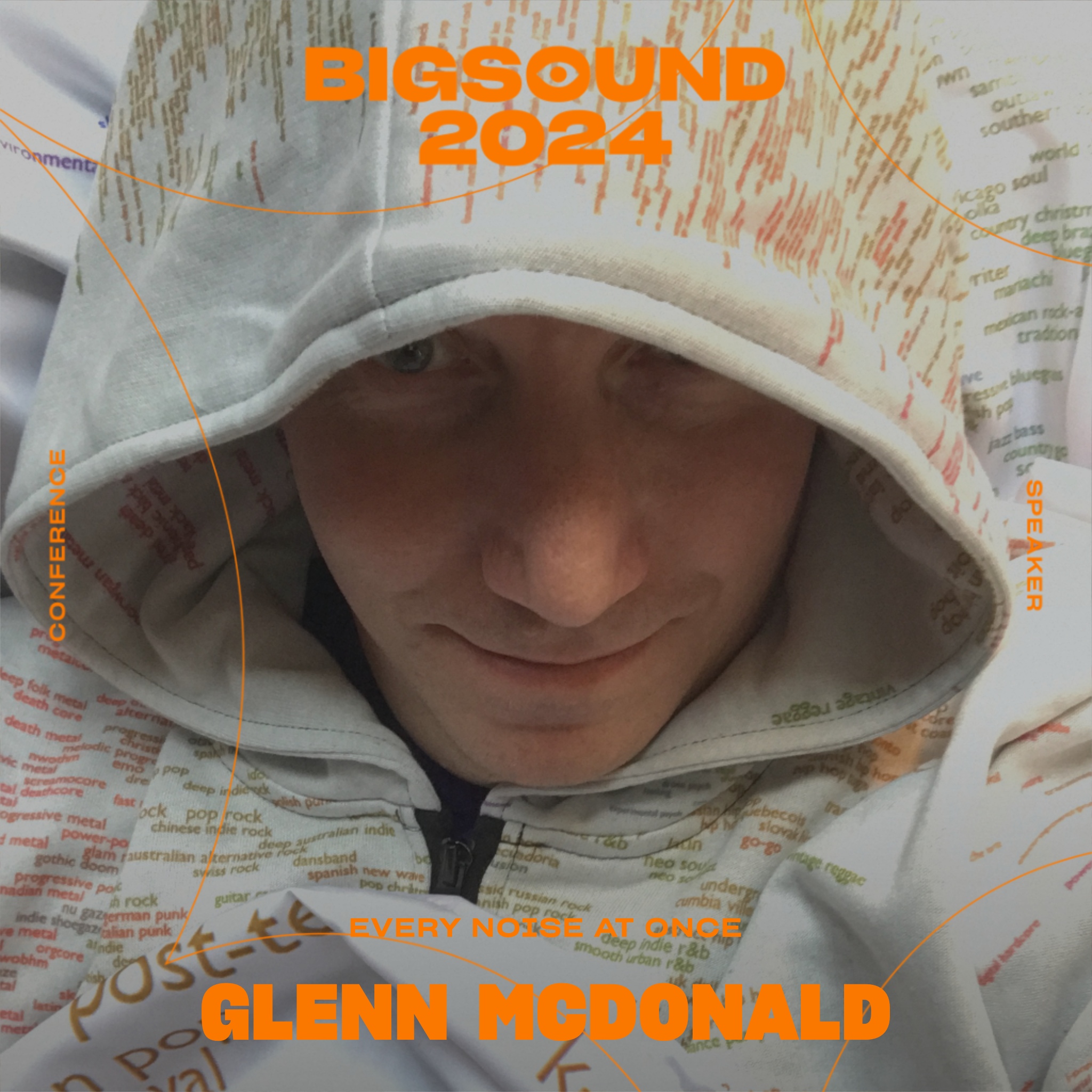
- I'm featured in an article about AI and the future in the French magazine Usbek & Rica this month. My copy hasn't arrvied yet, and I think it's in French, so I'm as curious as anybody what I said.
- Iveta Hajdakova and Tom Hoy at the London international consulting group Stripe Partners, who I know from some work they did for Spotify while I was there, interviewed me about algorithms and music for their Viewpoints series.
- There's an interview/feature with/about me and You Have Not Yet Heard Your Favourite Song both in print and online in the Polish magazine Polityka.
- I'll be making my second ever visit to the southern hemisphere, and first to New Zealand and Australia, to appear in conversation at Going Global Music Summit 2024 in Auckland, August 29-30, and then BIGSOUND 2024 in Brisbane, September 2-6!

You Have Not Yet Heard Your Favourite Song began in a Google doc I had provisionally titled Every Noise at Once: New Fears and New Joys From the Streaming Liberation of All the World's Music. The first chapter-list I made there was mostly just a chronological free-association of stories I tell. That structure was useful in suggesting that there was probably a book's quantity of words involved, but when we started sending this outline and a few sample chapters to publishers, the fairly unanimous response was that I was not famous enough for strangers to want to read about my adventures in music just because I had them.
I couldn't really argue with that, nor did I actually want to write a memoir. I wanted to try to formulate an argument. Not an entirely straightforward or linear argument, exactly, but still, something more like an essay than a memoir: not every noise, and not at once, but particular noises, in an order with progressions and resolutions.
Restructuring the list of stories into the outline of an essay was easy and encouraging, and a couple of the chapters I had written already nearly fit the new structure, but the first version's first chapter was quite clearly the first chapter of a memoir, and I just deleted it and started over.
And by "deleted", I mean that I copied it into a different doc in case I thought of some other use for it later. I just came across that doc again, and blogs solve the not-famous-enough problem by not asking anybody but you to care whether you care. So here, for no other reason than that I wrote it once, is that original first chapter of the memoir I didn't write:
I couldn't really argue with that, nor did I actually want to write a memoir. I wanted to try to formulate an argument. Not an entirely straightforward or linear argument, exactly, but still, something more like an essay than a memoir: not every noise, and not at once, but particular noises, in an order with progressions and resolutions.
Restructuring the list of stories into the outline of an essay was easy and encouraging, and a couple of the chapters I had written already nearly fit the new structure, but the first version's first chapter was quite clearly the first chapter of a memoir, and I just deleted it and started over.
And by "deleted", I mean that I copied it into a different doc in case I thought of some other use for it later. I just came across that doc again, and blogs solve the not-famous-enough problem by not asking anybody but you to care whether you care. So here, for no other reason than that I wrote it once, is that original first chapter of the memoir I didn't write:
Chapter 1: Precious Jukeboxes
Without music, I would not even exist.
This is probably true in some existential or logistic way for a lot of people, but music is literally how my parents met. They were folk-singing in New Haven, Connecticut, in 1963. My mother had a duo with a friend. My father was in a Peter, Paul & Mary-esque trio. My father was my mother's guitar-teacher before either of them realized they were my parents.
After they got married they moved to Texas, where my father came from, and there I grew up, with their records and their acoustic guitars. We begin with our parents' music. In my case this was a stereo in a cabinet in our living room and a small collection of LPs, mostly folk standards like The Weavers and The Kingston Trio, and some of their 70s successors from the gentle margins of pop, like Joan Baez and Judy Collins and John Denver. My mother had some Ray Charles and Dave Brubeck records from when she wrote jazz reviews for her school paper, and Eddie Fisher records from her days in his Fan Club. They did buy new records, occasionally, but rarely by new artists. They loved and valued music, but without any sense of frantic urgency or gnawing incompleteness. And thus, if you'd tried to categorize recorded music as an economic activity based on their music spending, you would probably have put it in the same tier with handmade ceramics or gardening trowels.
For popular music, or really anything except my parents' records, there was the car radio. My parents were exactly the right demographic for NPR, but mercifully the wrong personality types for talk-radio, so from the back seat I got to hear Casey Kasem or whatever shuffled loop of the top 40 was playing during the week in between canonical countdowns.
Looking over the charts from my childhood years, I find that by the 1976 chart I recognize almost everything. That was the year I was given my first record-player of my own, and the store where my father bought it foisted two 7" singles on him as part of the deal, which he dutifully passed along to me, probably without having listened to them first: the Starland Vocal Band's frankly inappropriate "Afternoon Delight" and Walter Murphy's ridiculously discofied "A Fifth of Beethoven". I would happily listen to either of these songs again if for some reason I was once again imprisoned in a musical void where no other songs existed.
But my emergent taste wasn't much more adventurous than those. The first record I bought with my own money, which of course is a milestone that dates me by the fact that it's a milestone, was the Eagles' Hotel California. My record-budget was such that even a single LP was a serious investment subject to a ruthless risk-assessment that realistically required me to already have heard and loved at least four of its songs, and the only place I would have heard them was on the car radio. The viable size of the music industry, at least judged by its access to the record budget of an average American 10-year-old, was probably measured in dozens of artists.
One day, on that radio, I heard "Hold the Line", by Toto. Heard with any kind of perspective, Toto is the softest of soft-rock bands, and the maudlin, patronizing "Africa" has more fittingly become their limp sigil. But about 10 seconds into "Hold the Line" there's a power chord. It is not the first mainstream pop hit with a power chord, but somehow it was the first one I heard. It sounded like a difference engine, to me, or a dragon made out of moonlight, or some kind of god tearing the universe open along a revealed seam. The album cover has a sword. That sword sliced through my world.
I am fully aware that writing an origin-myth for a life-long obsession with heavy metal that begins with "Hold the Line" is like saying your love of Thai food began with a wide noodle dipped in Pop Rocks. But that's how it began, for me, and in my world in 1978, that's kind of the only way anything ever began. One sound can change your life. Toto led me towards Foreigner and Bad Company and Boston. Not via fast clicks, because there was no Fans Also Like to navigate through, but over the excruciating course of radio months and tentative spending. In 1979 I got my first radio, a flip-number clock radio with a single tiny speaker and no headphone jack, so I would turn the volume knob all the way down and then press my ear to it in order to listen to The Great American Radio Show after my supposed bedtime. I found the two Album Rock stations my parents never played in the car. Toto led me to Boston, which got me to Kansas and Supertramp, and then to Rush. Give 12-year-olds a radio of their own, and maybe you can have hundreds of artists instead of dozens.
Meanwhile, reading Michael Moorcock books got me to his lyric-writing for Hawkwind, and then Blue Öyster Cult, who were the first band I ever saw in concert. The Moorcock-co-written Blue Öyster Cult song "Veteran of the Psychic Wars" also appeared on the soundtrack for the 1981 movie Heavy Metal, and that soundtrack also had "The Mob Rules", by Black Sabbath.
I definitely hadn't heard that on the radio. "The Mob Rules" starts with that guitar noise from the very first moment, churning, relentless. Ronnie James Dio howls demonically, not like a halloween-costume devil but like an exiled lord of a forsaken realm. Cymbals start crashing like the night sky is the sun coming apart into shards. If pop was about melody, disco was about movement and rock was about energy, then metal was about power. Not about the ends of power or its victims, but about the visceral feeling of wielding it, of how it runs through you, of how it makes you want more.
Thus began my record-collecting life, in earnest, as a quest to find out what else the radio wasn't telling me about, and how else it could make me feel. But it was so hard to begin, when every step required all of your budget, and knowledge you mostly didn't have. Jukeboxes say 25¢ on them, which sounds cheap, but knowing what songs to play cost more than coins, and knowing what songs weren't in them didn't even have a coin slot. Music discovery, thus, was still barely a thing. Or it was, but as if Ferdinand Magellan had travelled from Portugal to Spain to receive a royal commission to go back and discover Portugal again.
And even if I had somehow discovered the shores of a new world, what would I have done? I'd heard "Dancing Queen", I knew ABBA were from Sweden, I knew roughly where that was. I didn't know it would later become a specifically important part of my life, but I'm sure I would have assumed there were more people making music there than just ABBA, if it had occurred to me to entertain the question.
But so what? There were no other Swedish pop songs on the radio. There were no other Swedish records in the record stores. There were no magazines about Swedish music at the drugstore, or books about it in the library. None of my friends knew anything else about Swedish music than ABBA, either. To learn about Gräs och Stenar, or Nationalteatern, or Gyllene Tider, all I would have been able to do was wait, patiently, to become old enough to get a job to save up for a plane ticket to Stockholm, where I would have had to find a telephone directory and figure out how to look up where the record stores were, and then go hope somebody in one of them spoke English and was willing to explain Swedish pop history to a random kid from Texas.
The world was full of music. But I was standing in the same record stores, flipping through the same few mute sealed packages over and over, wondering what was inside them and what was missing, wanting to know.
Without music, I would not even exist.
This is probably true in some existential or logistic way for a lot of people, but music is literally how my parents met. They were folk-singing in New Haven, Connecticut, in 1963. My mother had a duo with a friend. My father was in a Peter, Paul & Mary-esque trio. My father was my mother's guitar-teacher before either of them realized they were my parents.
After they got married they moved to Texas, where my father came from, and there I grew up, with their records and their acoustic guitars. We begin with our parents' music. In my case this was a stereo in a cabinet in our living room and a small collection of LPs, mostly folk standards like The Weavers and The Kingston Trio, and some of their 70s successors from the gentle margins of pop, like Joan Baez and Judy Collins and John Denver. My mother had some Ray Charles and Dave Brubeck records from when she wrote jazz reviews for her school paper, and Eddie Fisher records from her days in his Fan Club. They did buy new records, occasionally, but rarely by new artists. They loved and valued music, but without any sense of frantic urgency or gnawing incompleteness. And thus, if you'd tried to categorize recorded music as an economic activity based on their music spending, you would probably have put it in the same tier with handmade ceramics or gardening trowels.
For popular music, or really anything except my parents' records, there was the car radio. My parents were exactly the right demographic for NPR, but mercifully the wrong personality types for talk-radio, so from the back seat I got to hear Casey Kasem or whatever shuffled loop of the top 40 was playing during the week in between canonical countdowns.
Looking over the charts from my childhood years, I find that by the 1976 chart I recognize almost everything. That was the year I was given my first record-player of my own, and the store where my father bought it foisted two 7" singles on him as part of the deal, which he dutifully passed along to me, probably without having listened to them first: the Starland Vocal Band's frankly inappropriate "Afternoon Delight" and Walter Murphy's ridiculously discofied "A Fifth of Beethoven". I would happily listen to either of these songs again if for some reason I was once again imprisoned in a musical void where no other songs existed.
But my emergent taste wasn't much more adventurous than those. The first record I bought with my own money, which of course is a milestone that dates me by the fact that it's a milestone, was the Eagles' Hotel California. My record-budget was such that even a single LP was a serious investment subject to a ruthless risk-assessment that realistically required me to already have heard and loved at least four of its songs, and the only place I would have heard them was on the car radio. The viable size of the music industry, at least judged by its access to the record budget of an average American 10-year-old, was probably measured in dozens of artists.
One day, on that radio, I heard "Hold the Line", by Toto. Heard with any kind of perspective, Toto is the softest of soft-rock bands, and the maudlin, patronizing "Africa" has more fittingly become their limp sigil. But about 10 seconds into "Hold the Line" there's a power chord. It is not the first mainstream pop hit with a power chord, but somehow it was the first one I heard. It sounded like a difference engine, to me, or a dragon made out of moonlight, or some kind of god tearing the universe open along a revealed seam. The album cover has a sword. That sword sliced through my world.
I am fully aware that writing an origin-myth for a life-long obsession with heavy metal that begins with "Hold the Line" is like saying your love of Thai food began with a wide noodle dipped in Pop Rocks. But that's how it began, for me, and in my world in 1978, that's kind of the only way anything ever began. One sound can change your life. Toto led me towards Foreigner and Bad Company and Boston. Not via fast clicks, because there was no Fans Also Like to navigate through, but over the excruciating course of radio months and tentative spending. In 1979 I got my first radio, a flip-number clock radio with a single tiny speaker and no headphone jack, so I would turn the volume knob all the way down and then press my ear to it in order to listen to The Great American Radio Show after my supposed bedtime. I found the two Album Rock stations my parents never played in the car. Toto led me to Boston, which got me to Kansas and Supertramp, and then to Rush. Give 12-year-olds a radio of their own, and maybe you can have hundreds of artists instead of dozens.
Meanwhile, reading Michael Moorcock books got me to his lyric-writing for Hawkwind, and then Blue Öyster Cult, who were the first band I ever saw in concert. The Moorcock-co-written Blue Öyster Cult song "Veteran of the Psychic Wars" also appeared on the soundtrack for the 1981 movie Heavy Metal, and that soundtrack also had "The Mob Rules", by Black Sabbath.
I definitely hadn't heard that on the radio. "The Mob Rules" starts with that guitar noise from the very first moment, churning, relentless. Ronnie James Dio howls demonically, not like a halloween-costume devil but like an exiled lord of a forsaken realm. Cymbals start crashing like the night sky is the sun coming apart into shards. If pop was about melody, disco was about movement and rock was about energy, then metal was about power. Not about the ends of power or its victims, but about the visceral feeling of wielding it, of how it runs through you, of how it makes you want more.
Thus began my record-collecting life, in earnest, as a quest to find out what else the radio wasn't telling me about, and how else it could make me feel. But it was so hard to begin, when every step required all of your budget, and knowledge you mostly didn't have. Jukeboxes say 25¢ on them, which sounds cheap, but knowing what songs to play cost more than coins, and knowing what songs weren't in them didn't even have a coin slot. Music discovery, thus, was still barely a thing. Or it was, but as if Ferdinand Magellan had travelled from Portugal to Spain to receive a royal commission to go back and discover Portugal again.
And even if I had somehow discovered the shores of a new world, what would I have done? I'd heard "Dancing Queen", I knew ABBA were from Sweden, I knew roughly where that was. I didn't know it would later become a specifically important part of my life, but I'm sure I would have assumed there were more people making music there than just ABBA, if it had occurred to me to entertain the question.
But so what? There were no other Swedish pop songs on the radio. There were no other Swedish records in the record stores. There were no magazines about Swedish music at the drugstore, or books about it in the library. None of my friends knew anything else about Swedish music than ABBA, either. To learn about Gräs och Stenar, or Nationalteatern, or Gyllene Tider, all I would have been able to do was wait, patiently, to become old enough to get a job to save up for a plane ticket to Stockholm, where I would have had to find a telephone directory and figure out how to look up where the record stores were, and then go hope somebody in one of them spoke English and was willing to explain Swedish pop history to a random kid from Texas.
The world was full of music. But I was standing in the same record stores, flipping through the same few mute sealed packages over and over, wondering what was inside them and what was missing, wanting to know.
Large Language Models, by encoding our language, also encode our beliefs about ourselves, exactly as confused and conflicting as they seem to us when we read them, too. When we ask these models to answer questions, we would like to think we are invoking our most aggregated collective wisdom, but more realistically we are usually eliciting the mean of our conditioned beliefs. We talk to ChatGPT as if it has patiently and lovingly studied us, crystalizing all the latent truths we have half discovered and half suspected. But what we have actually constructed is an erratic analogical model, and the most interesting parts of it are probably the ones in the middle, which are also exactly the ones that LLMs as chatbots are least intent on revealing.
One of the many amazing things ChatGPT can do, though, is describe images in words. Another one of these amazing things it can do is produce images from descriptions.
It's entertaining to chain these two things together. Tell it to describe a picture in precise detail, then give it back that description and tell it to generate that image. Here's a picture of my wife and I eating a casually celebratory dinner:
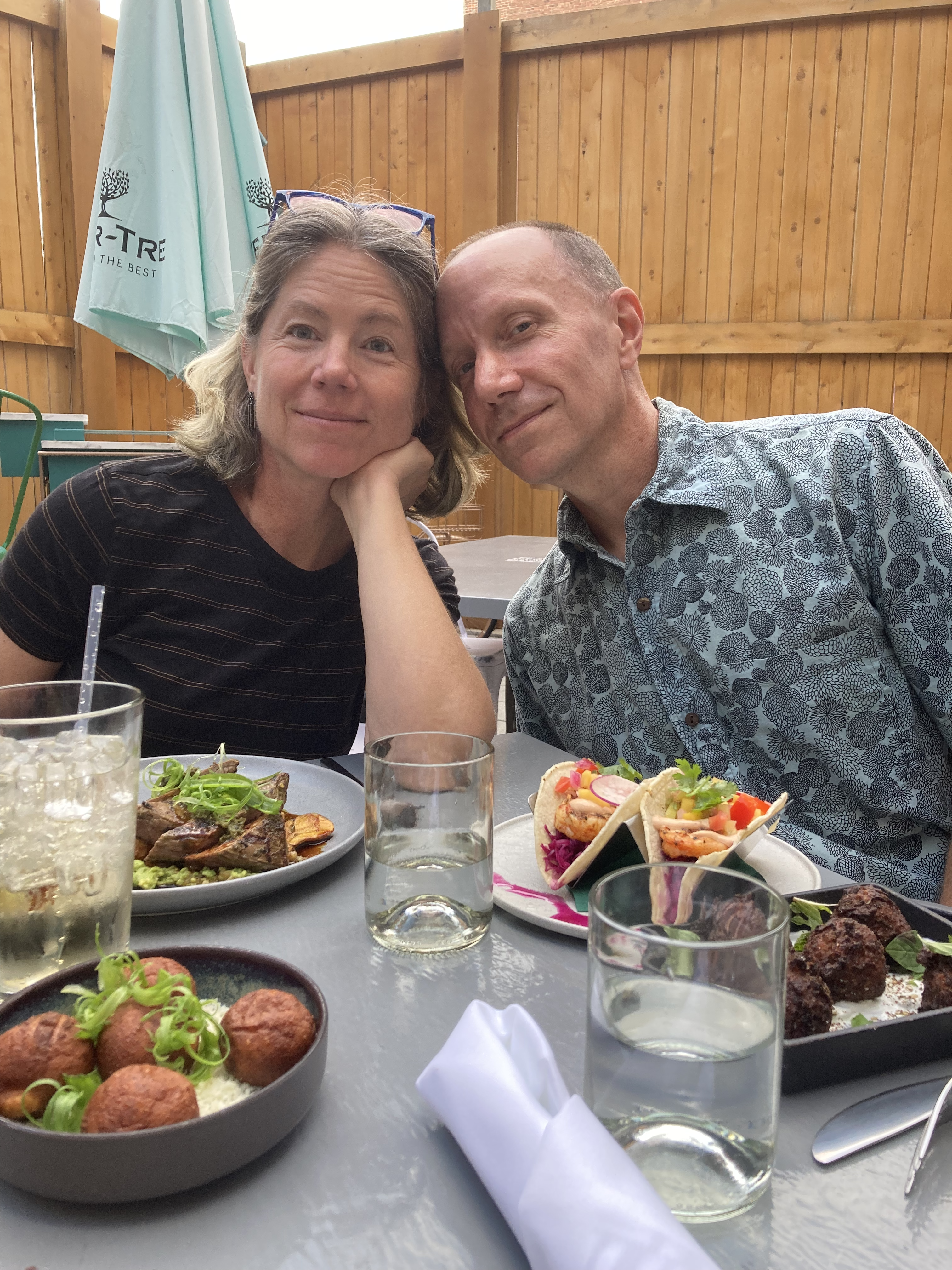
And here's what image-to-description-to-image turns us into:

It made us younger and hotter, obviously, but the other details are also intriguing. All the drinks have limes, now, and straws pointing right. The one closed umbrella has been rendered canonically open and multiple. Every major detail in the original picture has been transliterated into its paradigmatic, normative form. This process is even more obvious if you keep going a few more iterations, feeding each generated image back into the loop:



We have converged on the LLM equivalent of Platonic Forms: the most soft-taco-like soft tacos, the most people-being-photographed haircuts, the most endlessly elemental green picnic benches. Somehow we've ended up with several of the definitive little metal containers of small-bite-accompanying sauces, even though the original picture had zero of these. If photography is the documentation of specific light that actually exists for an isolated instant, independent of our subjective and temporal experience of it, then this is the opposite of that: an illustration of the schemata through which we perceive. But in the case of images, instead of a mean schema that integrates all of our diverse models, we get a median one drawn carelessly from the somewhere in the middle: these anonymous pretty people and their tiny aiolis, not depicted so much as photorealistically caricatured by schematography.
But then, one of the interesting things about photography is that our experience of our environment is never a simple geometry of light. I have a favorite vantage point on the Longfellow Bridge, between Cambridge and Boston, where I stop and take another frame of the same slow movie almost every day. The view is singular. The river and the sky bracket it cinemascopically, with the Esplanade stretched out across the midline, and Beacon Hill and downtown Boston rising up ahead of the bridge. I like this image, too, but it absolutely does not capture the feeling of standing on the bridge.

Run this photograph through our schematograph converter, though, and you get something that is wildly inaccurate but also sort of closer to the feeling:

The resulting dreamscape is, like the couple and their soft tacos, surprisingly stable across further iterations:



The actual Boston city-planners could explain some hard-learned lessons about running elevated freeways through the middle of your city, and maybe also give some basic-engineering tips about how suspension works. But as a rendition of what our cities would look like in the future if we had learned nothing from the past, this is both shiny and apt.
For now, though, while the city is still less shiny and more walkable, walk across that bridge, down the ducklings' path and past The Embrace to the office with me. The office windows overlook Readers' Park and the Boston Irish Famine Memorial, across the street from the Old South Meeting House. This is an intersection richly invested with American history, and also a Chipotle.
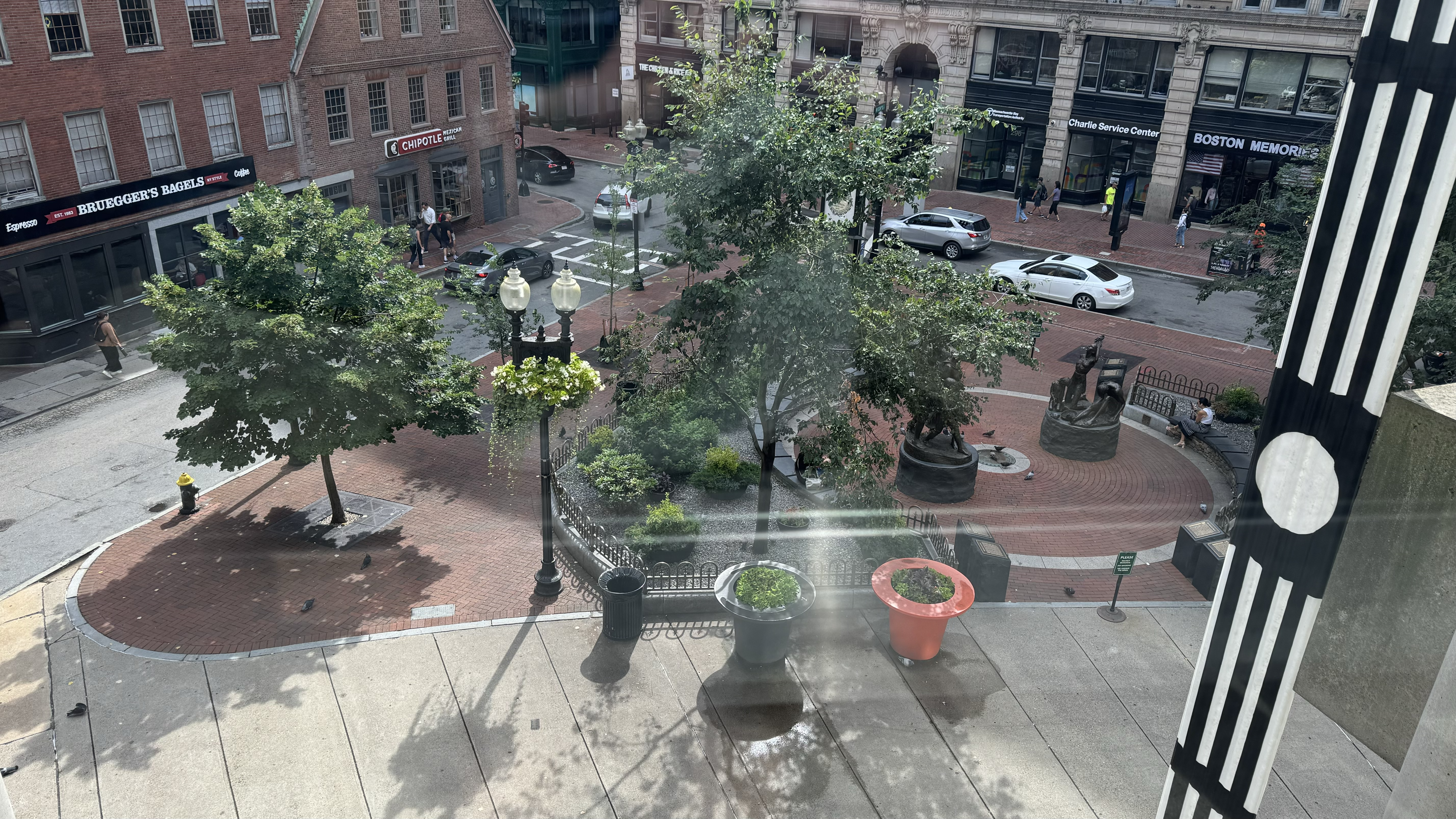
Schematography quantizes the particular odd geometry of this plaza into something more generically recognizable as City.

The urban equivalent of tiny aiolis appears to be rooftop HVAC units, which the schematograph has introduced into the view on its own. It seems a bit confused about the nature of automobiles, and has placed a couple of them on rooftops, one on a sidewalk and another wedged sideways next to the crosswalk that goes nowhere. The bench placements are a little dubious, and somebody appears to have left a garbage can on top of one. There's no way in or out of the little park, which the man at about 10:30 in the image has just realized.
These weirdnesses mostly get normalized out with a few more iterations, other than the bad parking, which is arguably the most Boston-like feature that survives the schematography:



Sometimes schematography is kind of what we're trying to do with photography anyway. This is a picture I took at a concert, and if you weren't there and naturally don't care about which specific show I was at, the schematographs of using darkness and lights as a sensory proxy for loud music in a crowded room are about as effective as the original:
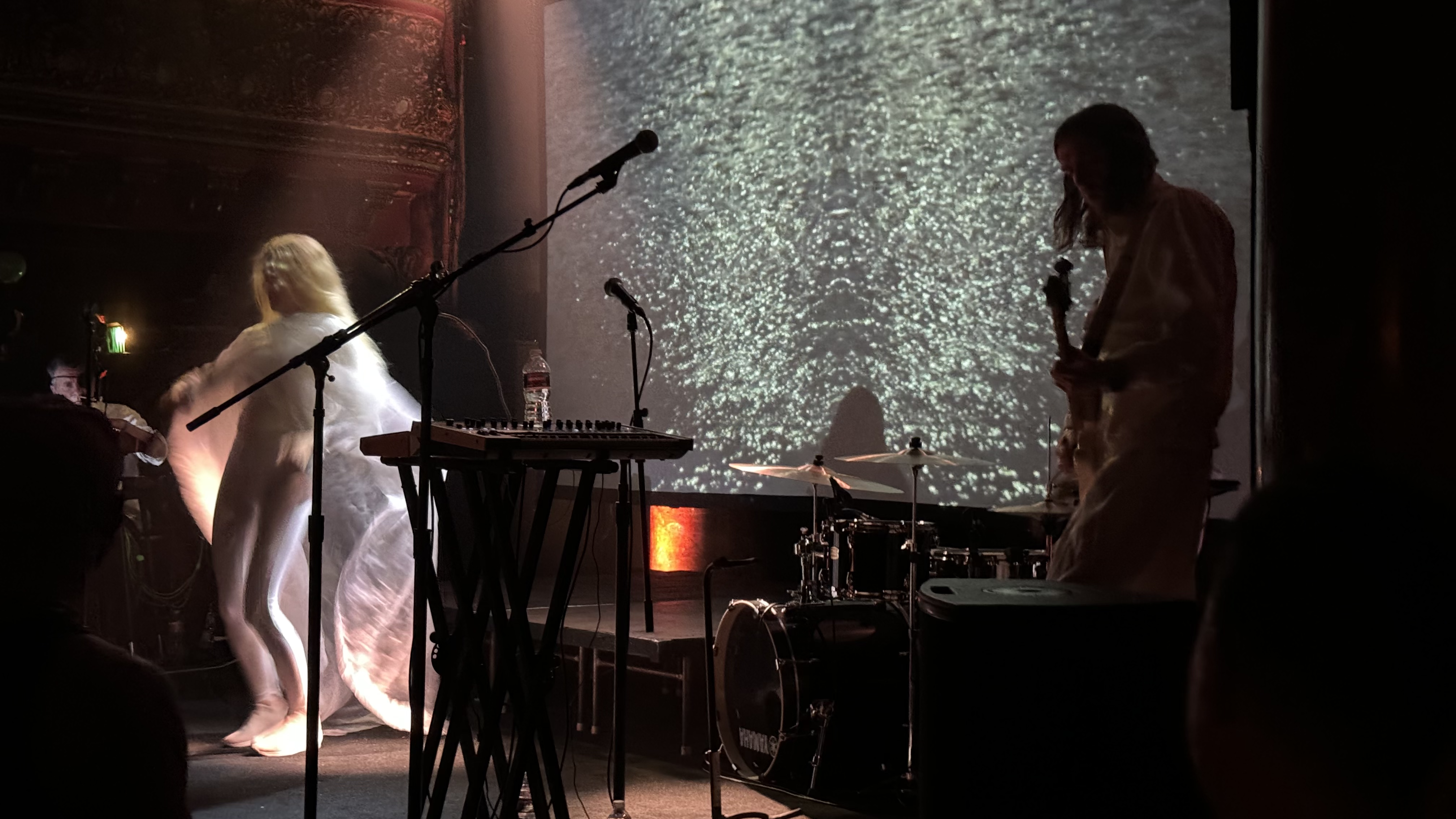




The drummer appears to be running out of drums by the last image, and is the guitarist going to play the thigh-high chinmes with the end of his guitar? Also, does the singer's uncle, dancing in the background, realize that he is visible to the audience?
Sometimes, though, we take pictures to remember moments that specifically matter. Here's one of those:
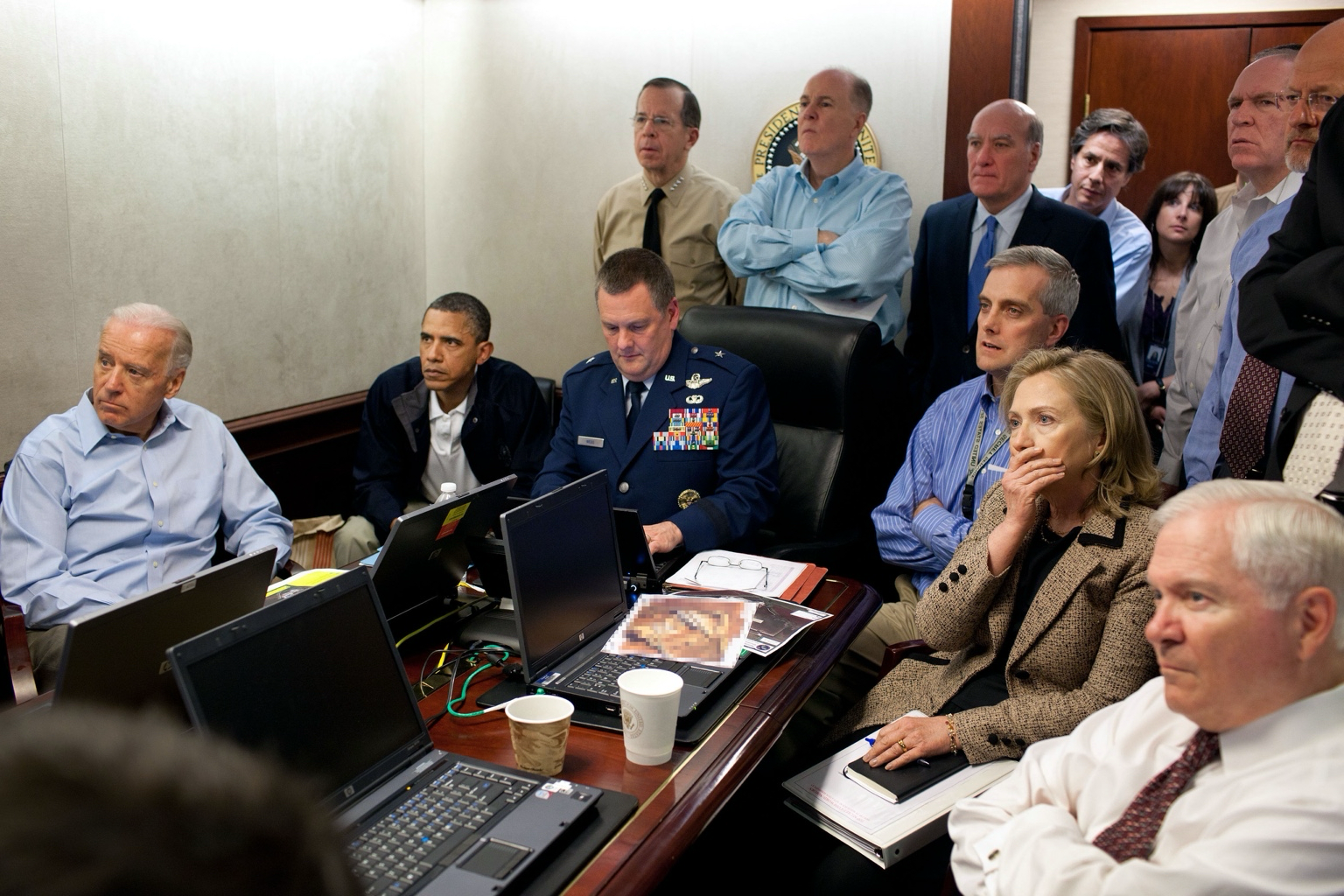
Run reality through the schematograph and you can be reminded sharply about the difference between what actually happens and the assumptions that pile up in our data.

In the warroom of our unexamined dreams, the men are steely and pale, the cable-management is magical, and we have outgrown disposable coffee cups. Military men will clone themselves like minions if you aren't careful. You bring in just one to run the PowerPoint and by the time he has the screen-mirroring working correctly the room is full of them.
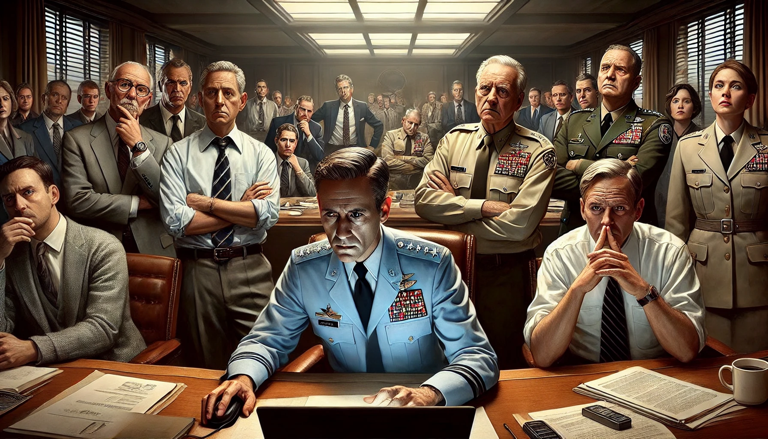
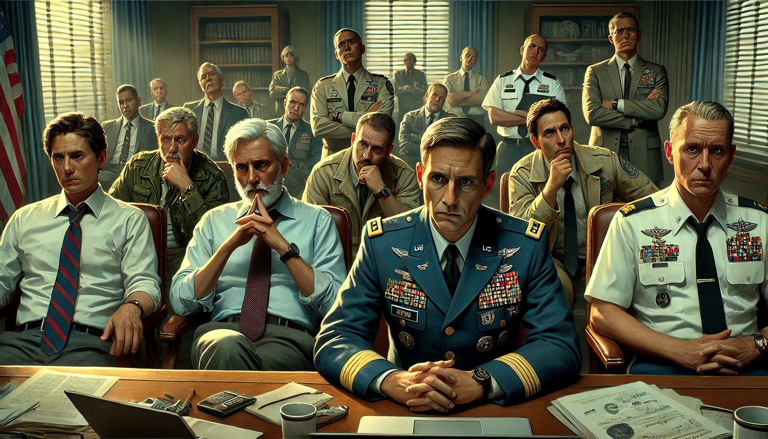
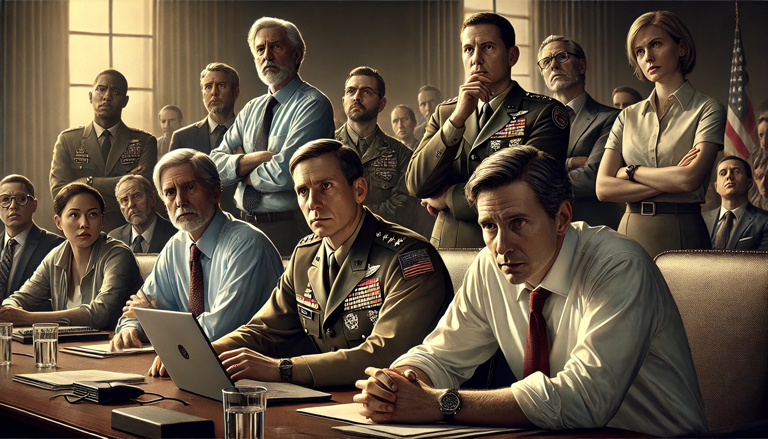
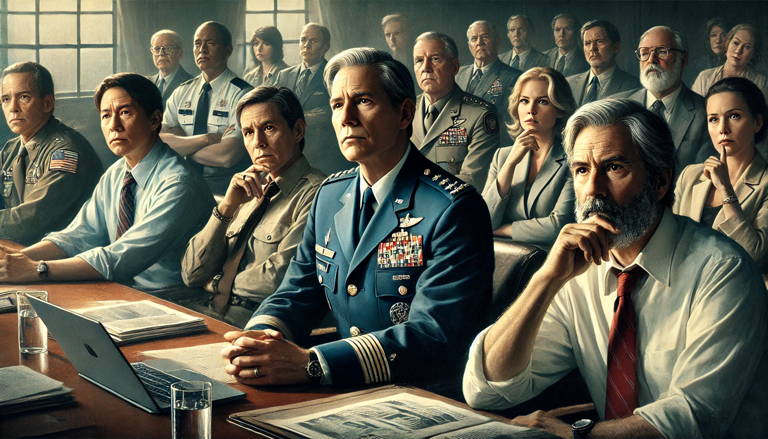
70 billion parameters are enough to suggest that some things are virtually certain. Men are serious, and serious things are meant for serious men. Serious men can be old or worried or both, but not neither. Serious men drink tap water. Women are occasional, but also the only ones who appear to be aware of what's going on around them. Something important is happening off-screen.
None of this is really news. Important things are always happening off-screen. Sometimes an unguarded reflection sneaks through, and we get a glimpse of the implied subject. The important present things for the future of Artificial Intelligence are probably the ways in which these schematographs and chatbots and accelerating generations are not intelligence, but the important present things for the future of people are probably the ways in which this automation is only superficially artificial. AI is not an alien oracle come to enlighten or enslave us. It's us, in increasingly elaborate costumes, aspiring to be unrecognizable in the most astonishing detail, but always absolutely unmistakable in our own limited and reconverging imaginations.
One of the many amazing things ChatGPT can do, though, is describe images in words. Another one of these amazing things it can do is produce images from descriptions.
It's entertaining to chain these two things together. Tell it to describe a picture in precise detail, then give it back that description and tell it to generate that image. Here's a picture of my wife and I eating a casually celebratory dinner:

And here's what image-to-description-to-image turns us into:

It made us younger and hotter, obviously, but the other details are also intriguing. All the drinks have limes, now, and straws pointing right. The one closed umbrella has been rendered canonically open and multiple. Every major detail in the original picture has been transliterated into its paradigmatic, normative form. This process is even more obvious if you keep going a few more iterations, feeding each generated image back into the loop:



We have converged on the LLM equivalent of Platonic Forms: the most soft-taco-like soft tacos, the most people-being-photographed haircuts, the most endlessly elemental green picnic benches. Somehow we've ended up with several of the definitive little metal containers of small-bite-accompanying sauces, even though the original picture had zero of these. If photography is the documentation of specific light that actually exists for an isolated instant, independent of our subjective and temporal experience of it, then this is the opposite of that: an illustration of the schemata through which we perceive. But in the case of images, instead of a mean schema that integrates all of our diverse models, we get a median one drawn carelessly from the somewhere in the middle: these anonymous pretty people and their tiny aiolis, not depicted so much as photorealistically caricatured by schematography.
But then, one of the interesting things about photography is that our experience of our environment is never a simple geometry of light. I have a favorite vantage point on the Longfellow Bridge, between Cambridge and Boston, where I stop and take another frame of the same slow movie almost every day. The view is singular. The river and the sky bracket it cinemascopically, with the Esplanade stretched out across the midline, and Beacon Hill and downtown Boston rising up ahead of the bridge. I like this image, too, but it absolutely does not capture the feeling of standing on the bridge.

Run this photograph through our schematograph converter, though, and you get something that is wildly inaccurate but also sort of closer to the feeling:

The resulting dreamscape is, like the couple and their soft tacos, surprisingly stable across further iterations:



The actual Boston city-planners could explain some hard-learned lessons about running elevated freeways through the middle of your city, and maybe also give some basic-engineering tips about how suspension works. But as a rendition of what our cities would look like in the future if we had learned nothing from the past, this is both shiny and apt.
For now, though, while the city is still less shiny and more walkable, walk across that bridge, down the ducklings' path and past The Embrace to the office with me. The office windows overlook Readers' Park and the Boston Irish Famine Memorial, across the street from the Old South Meeting House. This is an intersection richly invested with American history, and also a Chipotle.

Schematography quantizes the particular odd geometry of this plaza into something more generically recognizable as City.

The urban equivalent of tiny aiolis appears to be rooftop HVAC units, which the schematograph has introduced into the view on its own. It seems a bit confused about the nature of automobiles, and has placed a couple of them on rooftops, one on a sidewalk and another wedged sideways next to the crosswalk that goes nowhere. The bench placements are a little dubious, and somebody appears to have left a garbage can on top of one. There's no way in or out of the little park, which the man at about 10:30 in the image has just realized.
These weirdnesses mostly get normalized out with a few more iterations, other than the bad parking, which is arguably the most Boston-like feature that survives the schematography:



Sometimes schematography is kind of what we're trying to do with photography anyway. This is a picture I took at a concert, and if you weren't there and naturally don't care about which specific show I was at, the schematographs of using darkness and lights as a sensory proxy for loud music in a crowded room are about as effective as the original:





The drummer appears to be running out of drums by the last image, and is the guitarist going to play the thigh-high chinmes with the end of his guitar? Also, does the singer's uncle, dancing in the background, realize that he is visible to the audience?
Sometimes, though, we take pictures to remember moments that specifically matter. Here's one of those:

Run reality through the schematograph and you can be reminded sharply about the difference between what actually happens and the assumptions that pile up in our data.

In the warroom of our unexamined dreams, the men are steely and pale, the cable-management is magical, and we have outgrown disposable coffee cups. Military men will clone themselves like minions if you aren't careful. You bring in just one to run the PowerPoint and by the time he has the screen-mirroring working correctly the room is full of them.




70 billion parameters are enough to suggest that some things are virtually certain. Men are serious, and serious things are meant for serious men. Serious men can be old or worried or both, but not neither. Serious men drink tap water. Women are occasional, but also the only ones who appear to be aware of what's going on around them. Something important is happening off-screen.
None of this is really news. Important things are always happening off-screen. Sometimes an unguarded reflection sneaks through, and we get a glimpse of the implied subject. The important present things for the future of Artificial Intelligence are probably the ways in which these schematographs and chatbots and accelerating generations are not intelligence, but the important present things for the future of people are probably the ways in which this automation is only superficially artificial. AI is not an alien oracle come to enlighten or enslave us. It's us, in increasingly elaborate costumes, aspiring to be unrecognizable in the most astonishing detail, but always absolutely unmistakable in our own limited and reconverging imaginations.
¶ Filter domes, "made for you", and the kind of personalization that even makes personalization worse · 21 June 2024 listen/tech
Filter "bubbles" are charmingly weightless, delightful to pop. Sure, there's a slight soapy residue afterwards, but check your backpack: there are probably still a few old hand-sanitizer packets you shoved in there during the pandemic. Except sometimes you reach out, flirtatiously, to pop the shimmering bubble, and hit an intransigence made of polarized glass. Less bubble, more dome.
Spotify generates a lot of playlists that are "made for you", which generally means they have been aggressively adjusted to prioritize your previous listening. This is excellent for comfort, but terrible for exploration.
For example, Spotify is currently giving me a Synthwave Mix playlist on my Made For You page. I like synthwave, but I haven't been paying much focused attention to it lately, so it would be useful to me to hear what's going on there. "My" Synthwave Mix is made for me, though, so what it suggests is going on in synthwave is a) the handful of synthwave-adjacent bands I already specifically follow, and b) a lot of other bands I also already follow who are very definitely not synthwave.
I have a tool for this, though. If you stick the link to a Spotify made-for-you playlist into this:
https://everynoise.com/playlistprofile.cgi, e.g. Synthwave Mix
you can see what that playlist looks like before it gets personalized. In my case, this is almost completely different from what I end up with; only one artist* from the underlying source playlist ends up in my personalized version. That's not a lot of discovery potential. If there were a product feature to turn off the personalization, at least I could have discovered something here. Agency unlocks curiosity.
But since there are still, for the moment, better tools for genre exploration, I'm content to just ignore almost everything they make for me. In practice there is exactly one personalized Spotify playlist I use: Release Radar. This one is different because you actually do have some control over it, albeit not in a way that is totally apparent from looking at it. Release Radar will do its own inscrutable magic for you if you let it, but first it will find you new releases by artists you Follow. So if you follow enough artists, you can crowd out the "suggestions" and get a very useful release monitor. I follow 5124 artists, but you probably don't have to be that obsessive if you aren't me. Release Radar maxes out at 200 tracks. Even with 5124 artists to monitor, there are usually not more than 200 of them with new releases in any given week, so this is OK-ish. If you aren't me it's probably way more than enough.
In weeks when there are fewer than 200 new releases by artists I follow, Release Radar will fill out the rest of the 200 tracks with releases from the previous 3 weeks. This is an earnest idea, but counter-productive for me, personally, because I monitor new releases every week and I don't want to have the old tracks shown to me again as if they are new. So I generally stick my Release Radar playlist into the same playlist viewer linked above, where I can see the release dates of the tracks, and extract just the ones from the current week into a new playlist.
I usually do this first, and only really look at the new tracks once they're in the new playlist. This morning I went for a run before I'd done this, so I just put on Release Radar itself. The older tracks come at the end, and I wasn't going to be out for 12 hours, so it didn't matter. Later when I went to make my new-songs-only copy, though, I noticed that the first few tracks in my no-personalization viewer were not the same ones I had just heard. Weird. Flipping back and forth between the two views, it was clear that they were very different. Every Release Radar is unique, so my Release Radar is already filled with my artists, and thus you might think that this is the one time when "made for you" can't do any harm.
But oh, wait. Those older songs. Ugh.
Release Radar actually does assemble the list of new songs by artists I follow, like it's meant to. The pre-personalization view shows that this week 199 of my artists had new releases; only the 200th song in the underlying list is filler from a previous week. But then the made for you filter-dome snaps down, and songs I want to hear from this week are obtusely replaced with older songs by artists Spotify thinks are more familiar to me. Which are exactly the songs I am most likely to already have contemplated in the weeks when they were new. Two algorithms later, I end up with only 79 of the 199 new songs the first algorithm had in mind for me. "Catch all the latest music from artists you follow", Release Radar promises at the top. That's exactly what I want, and exactly what it could give me if it wanted to.
Algorithms, though, don't want things. We want things, and the algorithms do what they are ordered to do. I want all the latest music I might care about. Somebody who still works for Spotify wants something else. If you aren't me, maybe it still doesn't matter. If you only care about a few artists, you won't have this problem. If a streaming service only cares about people who only care about a few artists, they won't fix it**. If they don't employ enough people who care about everything, they may not even know. Maybe what they really want is to not have to care or know, and they have a comfort metric that allows them not to.
But all of this, the domes and the not caring and the not knowing, makes the world worse. I don't want to miss joy in favor of somebody else's obliviously generalized idea of my comfort. Neither should any of us.
* The one artist isn't even actually a synthwave artist. You can't really blame Spotify for that, though, as it's hardly their business to know the internal jargon of zero-cost content makers.
** One might reasonably ask why, given that I no longer work for Spotify, I haven't switched to some other streaming service, and the answer is that whatever they do or don't fix in the app, they still have the most useful programmatic API. That's how the playlist viewer works, and if you want new releases by all the artists you follow bad enough to write code, you can have that, too. And if you're me, now you do. One playlist minus one is zero. Ultimately the only person in "personalization" is the one doing it, and if you want your personalization to be personal, that person has to be you.
[23 August 2024 update: this week the post-processing reduces the underlying 200 songs in my Release Radar to just 30. That's pathetic.]
Spotify generates a lot of playlists that are "made for you", which generally means they have been aggressively adjusted to prioritize your previous listening. This is excellent for comfort, but terrible for exploration.
For example, Spotify is currently giving me a Synthwave Mix playlist on my Made For You page. I like synthwave, but I haven't been paying much focused attention to it lately, so it would be useful to me to hear what's going on there. "My" Synthwave Mix is made for me, though, so what it suggests is going on in synthwave is a) the handful of synthwave-adjacent bands I already specifically follow, and b) a lot of other bands I also already follow who are very definitely not synthwave.
I have a tool for this, though. If you stick the link to a Spotify made-for-you playlist into this:
https://everynoise.com/playlistprofile.cgi, e.g. Synthwave Mix
you can see what that playlist looks like before it gets personalized. In my case, this is almost completely different from what I end up with; only one artist* from the underlying source playlist ends up in my personalized version. That's not a lot of discovery potential. If there were a product feature to turn off the personalization, at least I could have discovered something here. Agency unlocks curiosity.
But since there are still, for the moment, better tools for genre exploration, I'm content to just ignore almost everything they make for me. In practice there is exactly one personalized Spotify playlist I use: Release Radar. This one is different because you actually do have some control over it, albeit not in a way that is totally apparent from looking at it. Release Radar will do its own inscrutable magic for you if you let it, but first it will find you new releases by artists you Follow. So if you follow enough artists, you can crowd out the "suggestions" and get a very useful release monitor. I follow 5124 artists, but you probably don't have to be that obsessive if you aren't me. Release Radar maxes out at 200 tracks. Even with 5124 artists to monitor, there are usually not more than 200 of them with new releases in any given week, so this is OK-ish. If you aren't me it's probably way more than enough.
In weeks when there are fewer than 200 new releases by artists I follow, Release Radar will fill out the rest of the 200 tracks with releases from the previous 3 weeks. This is an earnest idea, but counter-productive for me, personally, because I monitor new releases every week and I don't want to have the old tracks shown to me again as if they are new. So I generally stick my Release Radar playlist into the same playlist viewer linked above, where I can see the release dates of the tracks, and extract just the ones from the current week into a new playlist.
I usually do this first, and only really look at the new tracks once they're in the new playlist. This morning I went for a run before I'd done this, so I just put on Release Radar itself. The older tracks come at the end, and I wasn't going to be out for 12 hours, so it didn't matter. Later when I went to make my new-songs-only copy, though, I noticed that the first few tracks in my no-personalization viewer were not the same ones I had just heard. Weird. Flipping back and forth between the two views, it was clear that they were very different. Every Release Radar is unique, so my Release Radar is already filled with my artists, and thus you might think that this is the one time when "made for you" can't do any harm.
But oh, wait. Those older songs. Ugh.
Release Radar actually does assemble the list of new songs by artists I follow, like it's meant to. The pre-personalization view shows that this week 199 of my artists had new releases; only the 200th song in the underlying list is filler from a previous week. But then the made for you filter-dome snaps down, and songs I want to hear from this week are obtusely replaced with older songs by artists Spotify thinks are more familiar to me. Which are exactly the songs I am most likely to already have contemplated in the weeks when they were new. Two algorithms later, I end up with only 79 of the 199 new songs the first algorithm had in mind for me. "Catch all the latest music from artists you follow", Release Radar promises at the top. That's exactly what I want, and exactly what it could give me if it wanted to.
Algorithms, though, don't want things. We want things, and the algorithms do what they are ordered to do. I want all the latest music I might care about. Somebody who still works for Spotify wants something else. If you aren't me, maybe it still doesn't matter. If you only care about a few artists, you won't have this problem. If a streaming service only cares about people who only care about a few artists, they won't fix it**. If they don't employ enough people who care about everything, they may not even know. Maybe what they really want is to not have to care or know, and they have a comfort metric that allows them not to.
But all of this, the domes and the not caring and the not knowing, makes the world worse. I don't want to miss joy in favor of somebody else's obliviously generalized idea of my comfort. Neither should any of us.
* The one artist isn't even actually a synthwave artist. You can't really blame Spotify for that, though, as it's hardly their business to know the internal jargon of zero-cost content makers.
** One might reasonably ask why, given that I no longer work for Spotify, I haven't switched to some other streaming service, and the answer is that whatever they do or don't fix in the app, they still have the most useful programmatic API. That's how the playlist viewer works, and if you want new releases by all the artists you follow bad enough to write code, you can have that, too. And if you're me, now you do. One playlist minus one is zero. Ultimately the only person in "personalization" is the one doing it, and if you want your personalization to be personal, that person has to be you.
[23 August 2024 update: this week the post-processing reduces the underlying 200 songs in my Release Radar to just 30. That's pathetic.]
¶ You Have Not Yet Read Your Favourite Book · 20 June 2024 listen/tech
It's probably not the one I wrote. It would be weird if my book were your favorite book. It's a geeky book about music-streaming and music and algorithms and technology and curiosity and morality and where we are right now, and your favorite book should probably be an immortal novel about how we always are, or something you have re-read every year since you were 12 because it reminds you what you love and believe.
But my book about how streaming changes music is also kind of a book about loving and believing things, and the fears and joys that love and belief produce, because everything is if you really think about it, and I wrote a book about this stuff because I really think about it and didn't know how to stop.
As a method of not thinking about something any more, writing the book seems to have been fairly ineffective. I have kept thinking and writing about music and algorithms and technology and humanity. My new job, which doesn't have music anywhere in the wording of the mission, is just as fundamentally about figuring out how to use math and machines to amplify humanity instead of phase-cancelling it.
As an organized explanation of why I think streaming is good for music and music-streaming is good for humanity, though, I made it as coherent as I could. (And then a really good editor goaded me methodically into making it more coherent than that.) If you love music, you might like reading this book while you listen to whatever you are currently discovering or wondering or doubting. It's a book about discovery and wonder and productive doubt.
And it was officially published today.
You Have Not Yet Heard Your Favourite Song; Canbury Press, 2024.
US: bookshop.org or amazon.com or kindle
UK: uk.bookshop.org or amazon.co.uk or kindle UK
France (French): Hachette/Editions Marabout or Amazon.fr, September 2024
Taiwan (Chinese): ECUS Publishing House, December 2024
India (English): The Bombay Circle Press, December 2024
In London: Waterstones or Blackwells or Foyles
In Montreal: featured at Librairie Résonance

Some related links as I notice them:
2025
- One of Mixmag Asia's Six books on how streaming has forever changed our relationship with music, April 23
- A piece about the book in the Czech edition of Wired, February 4
2024
- A terrific review from book_click_deo on Instagram, December 23
- An interview for Fohlapress (or here) in Brazil, December 18
- An appearance on Bob Shami's Soundbreaker podcast, published December 12
- An interview in WNYU's STATIC magazine, December 7
- The Chinese and Indian editions are both out now, December 4
- The Chinese edition is coming! November 23
- Is this the 37th best book of 2024? An audacious claim from the Telegraph, November 17
- Read all the way to the end of this roundup of the best music books of 2024 in the Telegraph for a reminder that my book is optimistic and optimism is good, November 9
- The book and I feature in this Ars Technica story about a wave of junk music with real-artist names on Spotify, October 15
- An interview in the Chartmetric blog How Music Charts, October 9
- A review in The Quietus, September 28
- Carl Wilson and I talk about my book for the Popular Music Books in Process series, September 24
- A whole bonus episode of Your Morning Coffee Podcast, August 30.
- An appearance on the NZ podcast The Fold, August 28
- A article based on an interview with Radio New Zealand in advance of appearing at Going Global, August 28
- A mention on Your Morning Coffee Podcast, August 19 (from about 7:40-10:20) teasing an upcoming special episode with me
- A (second) appearance on Your Morning Coffee Podcast, August 5 (from about 19:09-27:45)
- An interview/feature in the Polish magazine Polityka, July 27
- An interview with Tom and Iveta at Stripe Partners for their Viewpoints series, July 25
- A book citation as part of my introduction into a story about algorithms and music discovery in Mission magazine, July 17 (with the excellent pull-quote "If you don’t want algorithms to feed you passive listening, get active.")
- A conversation with Mark Richardson for the Third Bridge Creative blog, July 9
- A print rendition of the interview from the earlier German radio piece in Die Tageszeitung, July 4
- A conversation with Walt Hickey on the Numlock Sunday podcast, June 30
- An appearance on The Ray D'Arcy Show on RTE Radio 1 Ireland, June 25 (from about 26:10-50:37; clip)
- An interview in the Dutch newsletter Weekly Wav, June 25
- An appearance on Your Morning Coffee Podcast, June 24 (from about 7:00-18:00)
- A conversation on the podcast The Gist, June 20
- A short interview on Newstalk in Ireland, June 19 (with a Cactus World News shout!)
- A radio piece in German on Deutschlandfunk Kultur, June 19 (with blasts of gothic metal and wisps of theremin!)
- A "new book" mention on Tinnitist, June 16
- A review in the Telegraph, June 4; also available via Yahoo News
- A conversation with Chris Dalla Riva in his newsletter Can't Get Much Higher, May 26
- An earlier appearance on Ari Herstand's The New Music Business podcast, April 10, with some book-anticipation towards the end
- The book's page on Goodreads
But my book about how streaming changes music is also kind of a book about loving and believing things, and the fears and joys that love and belief produce, because everything is if you really think about it, and I wrote a book about this stuff because I really think about it and didn't know how to stop.
As a method of not thinking about something any more, writing the book seems to have been fairly ineffective. I have kept thinking and writing about music and algorithms and technology and humanity. My new job, which doesn't have music anywhere in the wording of the mission, is just as fundamentally about figuring out how to use math and machines to amplify humanity instead of phase-cancelling it.
As an organized explanation of why I think streaming is good for music and music-streaming is good for humanity, though, I made it as coherent as I could. (And then a really good editor goaded me methodically into making it more coherent than that.) If you love music, you might like reading this book while you listen to whatever you are currently discovering or wondering or doubting. It's a book about discovery and wonder and productive doubt.
And it was officially published today.
You Have Not Yet Heard Your Favourite Song; Canbury Press, 2024.
US: bookshop.org or amazon.com or kindle
UK: uk.bookshop.org or amazon.co.uk or kindle UK
France (French): Hachette/Editions Marabout or Amazon.fr, September 2024
Taiwan (Chinese): ECUS Publishing House, December 2024
India (English): The Bombay Circle Press, December 2024
In London: Waterstones or Blackwells or Foyles
In Montreal: featured at Librairie Résonance

Some related links as I notice them:
2025
- One of Mixmag Asia's Six books on how streaming has forever changed our relationship with music, April 23
- A piece about the book in the Czech edition of Wired, February 4
2024
- A terrific review from book_click_deo on Instagram, December 23
- An interview for Fohlapress (or here) in Brazil, December 18
- An appearance on Bob Shami's Soundbreaker podcast, published December 12
- An interview in WNYU's STATIC magazine, December 7
- The Chinese and Indian editions are both out now, December 4
- The Chinese edition is coming! November 23
- Is this the 37th best book of 2024? An audacious claim from the Telegraph, November 17
- Read all the way to the end of this roundup of the best music books of 2024 in the Telegraph for a reminder that my book is optimistic and optimism is good, November 9
- The book and I feature in this Ars Technica story about a wave of junk music with real-artist names on Spotify, October 15
- An interview in the Chartmetric blog How Music Charts, October 9
- A review in The Quietus, September 28
- Carl Wilson and I talk about my book for the Popular Music Books in Process series, September 24
- A whole bonus episode of Your Morning Coffee Podcast, August 30.
- An appearance on the NZ podcast The Fold, August 28
- A article based on an interview with Radio New Zealand in advance of appearing at Going Global, August 28
- A mention on Your Morning Coffee Podcast, August 19 (from about 7:40-10:20) teasing an upcoming special episode with me
- A (second) appearance on Your Morning Coffee Podcast, August 5 (from about 19:09-27:45)
- An interview/feature in the Polish magazine Polityka, July 27
- An interview with Tom and Iveta at Stripe Partners for their Viewpoints series, July 25
- A book citation as part of my introduction into a story about algorithms and music discovery in Mission magazine, July 17 (with the excellent pull-quote "If you don’t want algorithms to feed you passive listening, get active.")
- A conversation with Mark Richardson for the Third Bridge Creative blog, July 9
- A print rendition of the interview from the earlier German radio piece in Die Tageszeitung, July 4
- A conversation with Walt Hickey on the Numlock Sunday podcast, June 30
- An appearance on The Ray D'Arcy Show on RTE Radio 1 Ireland, June 25 (from about 26:10-50:37; clip)
- An interview in the Dutch newsletter Weekly Wav, June 25
- An appearance on Your Morning Coffee Podcast, June 24 (from about 7:00-18:00)
- A conversation on the podcast The Gist, June 20
- A short interview on Newstalk in Ireland, June 19 (with a Cactus World News shout!)
- A radio piece in German on Deutschlandfunk Kultur, June 19 (with blasts of gothic metal and wisps of theremin!)
- A "new book" mention on Tinnitist, June 16
- A review in the Telegraph, June 4; also available via Yahoo News
- A conversation with Chris Dalla Riva in his newsletter Can't Get Much Higher, May 26
- An earlier appearance on Ari Herstand's The New Music Business podcast, April 10, with some book-anticipation towards the end
- The book's page on Goodreads




